








November 2022 Vol - 4 Issue - 15
Dr. Manoj Varghese, Ph.D
Managing Editor
Sarath Shyam
Consultant Editors
Dr. John Andrews
Anuja Mulmule
Emma James Andrew Scott Suchita Gonsalves
Editorial Enquiry: admin@highereducationdigest.com


Charlie Jameson Manjunath R Louis Bernard
Naomi Wilson Stanly Lui Roshni Rajagopal Sabrina Samson Keith Alexander Ajay Das Rohith Poojary Shirley David
Branding & Marketing Partnerships

Jennifer Anderson Monica Davis Suchita Sethy Siva Kumar Jessica Edword


Rachel Roy Shubham Amle Anna Elza Stephen Donnell Cathy Che
Partnerships Enquiry: admin@highereducationdigest.com

Free Subscription www.highereducationdigest.com

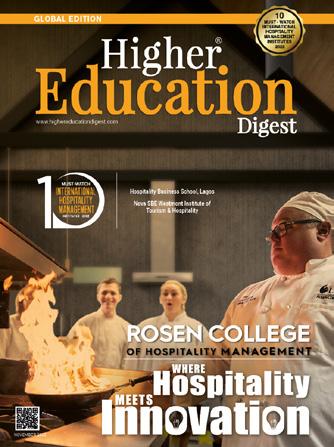
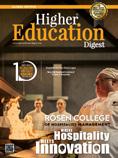
Americas

Connecta Global LLC 16192 Coastal Highway, Lewes, DE 19958, USA
Europe

Connecta Global Ltd. 27, Old Gloucester Street, London, WC1N 3AX, UK
Middle East & Africa
Focus Innovation Technologies FZE P.O. Box 48299, Dubai Silicon Oasis, Dubai, UAE
Asia-Pacific
Connecta Innovation Pvt. Ltd. Ramanashree Arcade, 18 MG Road, Bangalore – 560001, India

Higher Education Digest is a digital magazine published by Connecta Innovation Private Limited. All rights reserved. The opinions expressed in the content and pictures provided are those of the authors. They do not purport to reflect the opinions or views of the Connecta Innovation Private Limited or any of its members and we do not assume any responsibility. The publisher does not assume any responsibility for the advertisements, its content, pictures, and all representation of warranties made in such advertisements are those of the advertisers and not of the publisher.
Higher Education Digest is a Free Subscription digital magazine strictly not for sale and has to be strictly for internal private use only. Publisher does not assume any responsibility arising out of anyone printing copy of this digital magazine in any format and in any country and all matters related to that.
The ball is rolling in the middle east, and the world is glued to it. But what makes FIFA World Cup Qatar 2022 an exciting event for hospitality professionals? A large-scale event in a tiny but prosperous nation like Qatar means business and countless opportunities in the hospitality sector. In fact, it was predicted that hosting the international game would create more than 1.5 million new job opportunities in Qatar in key sectors like construction, real estate, and hospitality. For instance, Accor - a French multinational hospitality company - reported that it would recruit 12,000 hospitality professionals during its involvement in the FIFA World Cup Qatar 2022 to manage 65,000 apartments, homes and villas in the country.
The surge in demand for hospitality professionals is not an event-based phenomenon. Despite being one of the hardest-hit industries by COVID-19, hotels, catering, and tourism have made a remarkable comeback and now filling their
vacant job positions. According to Hospitality Global Market Report 2022, the global hospitality market is expected to grow from USD 3,952.87 billion in 2021 to USD 4,548.42 billion in 2022 at a compound annual growth rate (CAGR) of 15.1 per cent.
To help this industry to take a giant leap, global hospitality education institutions are preparing their students with an armoury of new-age skills. In this issue, we have identified ‘10 Must-Watch International Hospitality Management Institutes - 2022’ that are creating a global workforce with solid theoretical knowledge and practical skills and competencies required by modern society. On the cover, we feature Rosen College of Hospitality Management at the University of Central Florida, which meets every industry requirement with its multi-faceted approach that transforms individuals into professionals fully equipped to cater to this industry. Enjoy Reading.
Sarath Shyam
Ex-M
Mr. Amulya Sah, PGD PM & IR, PG Diploma in PM&IR (XISS Ranchi)
Chief Human Resources Officer, Former Head HR group Samsung R&D Institute India,Transformative HR Leader, Change agent, Digitization facilitator, Engagement architect, Trainer and Diversity champion.


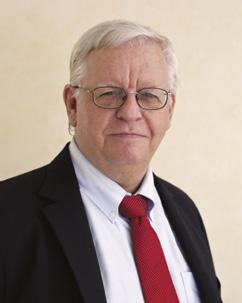
Dr. Varughese K.John, PhD, MBA, MPhil, MCom, LLB.
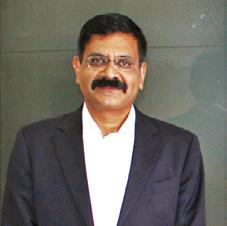

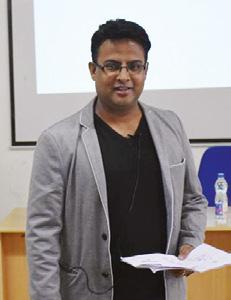
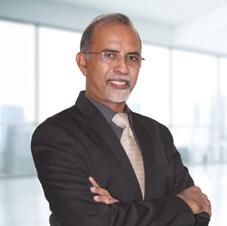
Former Program Director, MS in Management Program, GSATM - AU
Dr. Ajay Shukla, Ph.D, MBA, BE. Co-founder and Chief Strategy Officer at Higher Education UAE
Dr. Kuldeep Nagi, Ph.D, MBA, BSc.

Former Program Director of Ph.D, Recipient of Fulbright Fellowship Award & Dan Evans Award for Excellence and Writer columnist.
Shanthi Rajan (MSHRM, FHEA, AMCILT) Director, Institution Development, University of Stirling, RAK Campus, UAE.
Dr. Hans A. Andrews Ed.D. Distinguished Fellow in Community College Leadership, Olney Central College, Illinois,USA

Mr. Sreedhar Bevara, MBA, B.Com

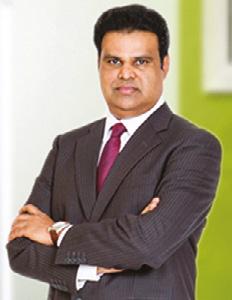

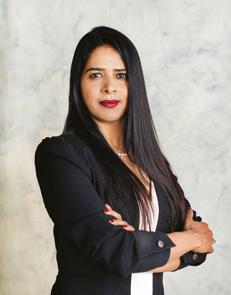
CEO at BMR Innovations, Ex Senior General Manager at Panasonic, LG, The Hindu, TATA, Author: Moment of Signal & The Roaring Lambs, Motivational Speaker & Leadership Consultant.
Dr. Khyati Shetty Ph.D (Marketing)., SFHEA (UK), MBA (Marketing), PGHRM, BA (Marketing & Economics)
Dr. Manoj Varghese, Ph.D
Senior Director - Global Partnerships, Advisory & Consulting - Connecta®, Head of Advisory BoardHigher Education Digest® & K12 Digest®, Adjunct Faculty - Assumption University, Former CIO - Athena Education, Former Global Director TechnologyGEMS Education
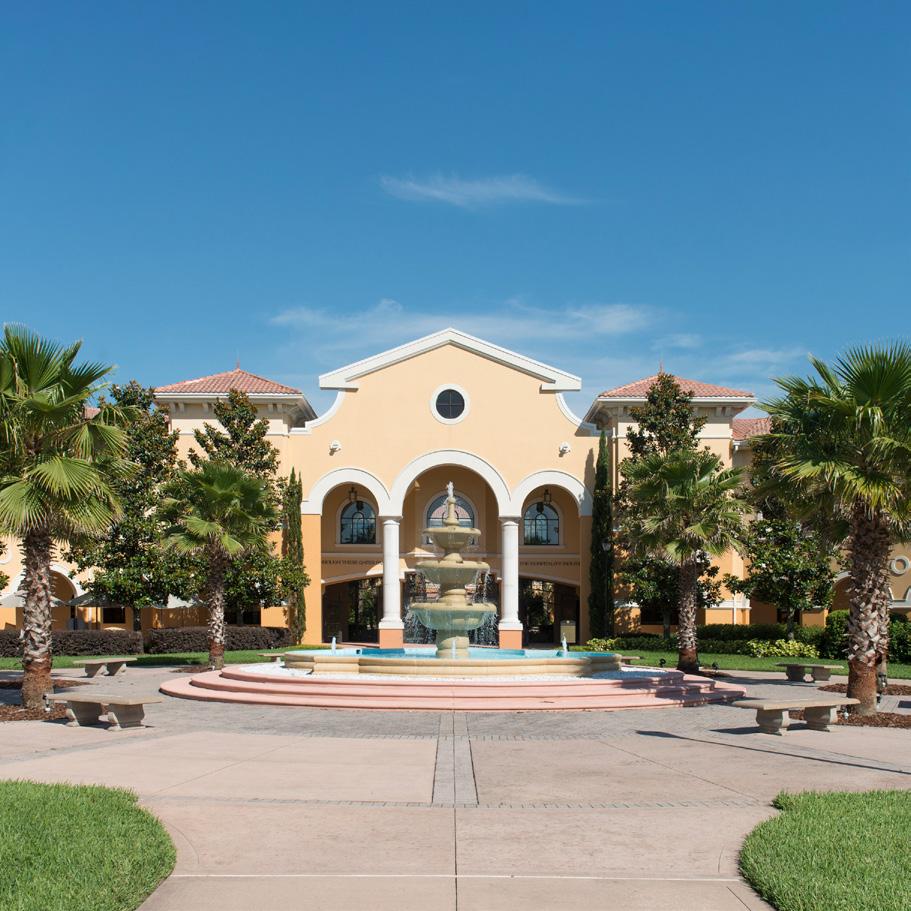
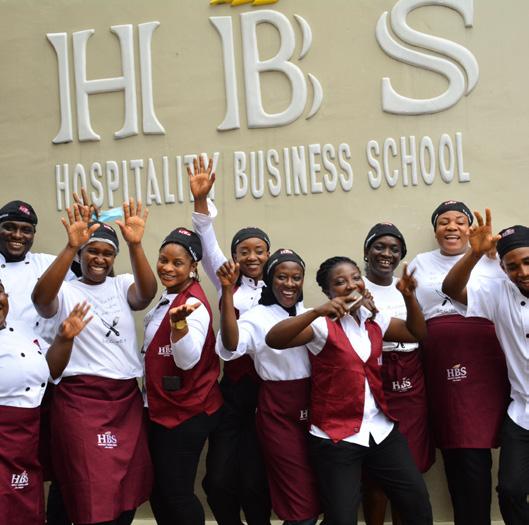

Dr. Hans A. Andrews (Distinguished Fellow in Community College Leadership at Olney Central College, Illinois) and Dr. John Erwin (Former President of Illinois Central College)


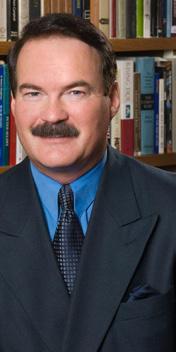
Sender Dovchin, Principal Research Fellow and Associate Professor, Curtin University, Australia
68
Prateek Gujral, Principal Advisor (South Asia), Augustana University, South Dakota, US
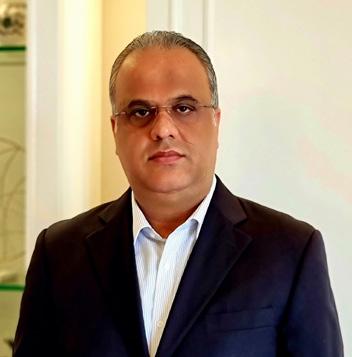
WHY LINGUISTIC RACISM DEMANDS GLOBAL ATTENTION, NOW?
BENEFITS OF THE AFTER-ACTION REVIEW IN HIGHER EDUCATION
Brendan T. Kelly, Senior Administrator, After Action Review, Office of the President, University of North Texas Health Science Center
54
COMMUNITY COLLEGES EMBRACING THE CODING BOOTCAMP MODEL TO INCREASE ACCESSIBILITY
Nick Suwyn, Founder & CEO, Promineo Tech
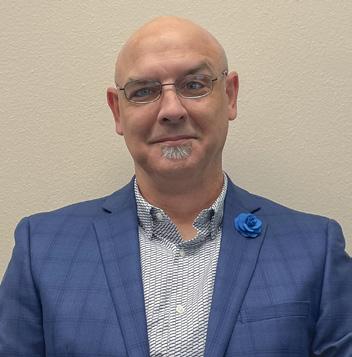

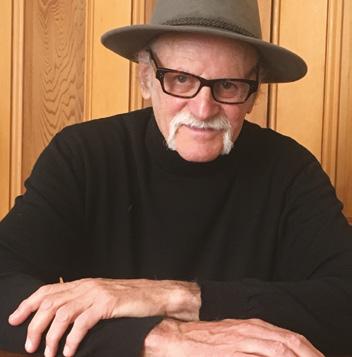
HOW TO SURVIVE IN A TROUBLED ECONOMY
David Parker, Author of Income and Wealth and A San Francisco Conservative
Brendan T. Kelly, Senior Administrator, After Action Review, Office of the President, University of North Texas Health Science Center
As a member of the U.S. Army for over twenty-years we used the After-Action Review process before, during and after all events.
The AAR was planned for and incorporated into training, deployments and projects. Whether it was an in-formal AAR, used to learn on the spot. Or, a formal
AAR that followed immediately after an event was over.
Now that I am working in higher education as an AAR senior administrator I have reached out to colleagues in other colleges and universities, only to discover that the AAR process is mostly used in their emergency management’s department, if they have an
There are many benefits of incorporating the After-Action Review into higher education. The first one I’d like to share is that it creates and promotes a culture of learning
at the University of North Texas Health Science Center. He’s worked in human resources and talent management to develop effective processes and improve the flow of communication. Brendanhastwentyplusyearsleading,teachingandfacilitatingtheAARprocess,whileserving in the U.S. Army. Additionally, he has served as a Leadership Education teacher, providing high school students with knowledge of how to analyze events and plans. His passion is helping teammembersandorganizationsimproveuponwhattheydotoexcelinfutureevents.Brendan received his Bachelors of Science and his MBA from Columbia Southern University, he is also a certified Lean Six Sigma Black Belt.
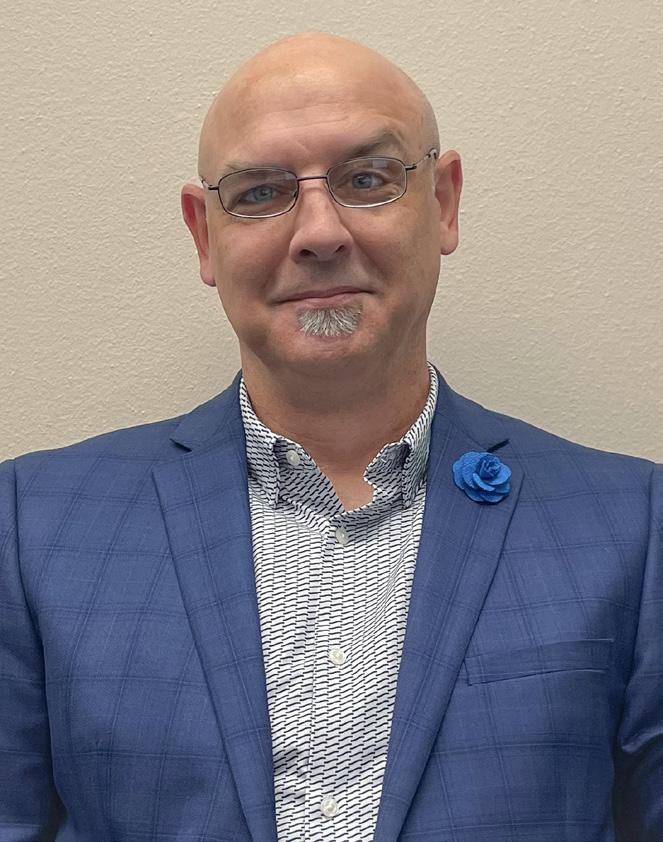
AAR process at all. Used as a follow-up to emergencies or natural disasters. While I do understand the use of the AAR in this area, they are missing the opportunity to use all the benefits of an AAR in other areas on their campuses.
The U.S. Army developed the After-Action Review process in the late 1970’s. They had to address and understand how best to train and prepare for the future. Thus, the idea of learning from what we’ve done to improve what we do led to the After-Action Review. The AAR process asks four main openended questions to participants. Guided by a facilitator, participants answer what was supposed to happen, what actually happened, what went right and wrong as well as what to do differently next time.
When these questions are answered, they lead to new questions and answers, the open and respectful discussion leads to discovering lessons learned. Participants begin to understand the “why,” and when the “why” is understood, engagement amongst team members is higher.
There are many benefits of incorporating the After-Action Review into higher education. The first one I’d like to share is that it creates and promotes a culture of learning.
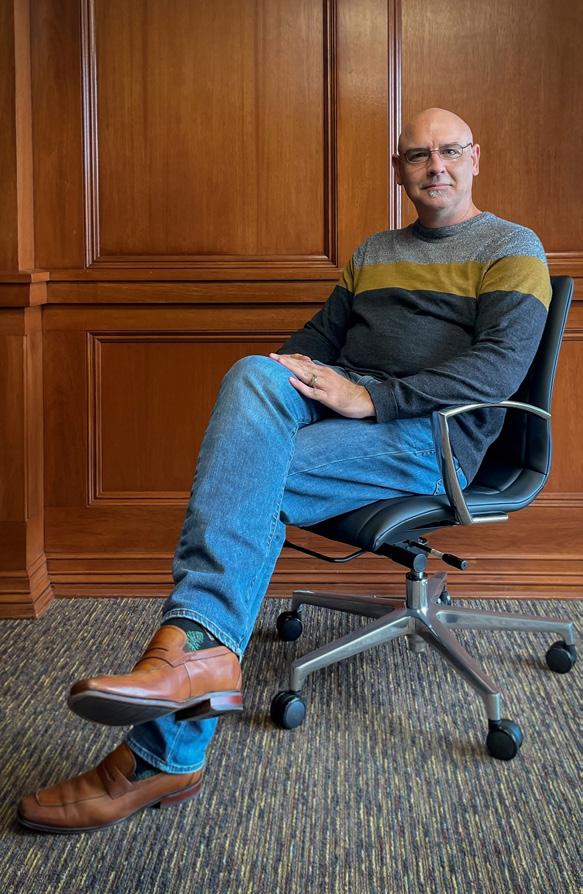
When all participants, regardless of position or tenure with the organization, can respectfully listen and learn another’s perspective, it helps to develop understanding. When we can share openly and respectfully, without the fear of repercussions, we can then grow as a team and develop trust.
Another benefit is for leadership and individuals to learn more about their
organizational and individual strengths and weaknesses. I’m reminded of the saying, “You only know what you know. And, you don’t know what you don’t know.” This is so true and sometimes fellow colleagues or subordinates just might be embarrassed or afraid to share this.
Fear not though, none of us are perfect and we all have room for growth.
So, whether you do it on your own or with a team, take time to explore and share your organizational and individual strengths and weaknesses. After all, we are all in this together, we succeed as a team.
A few other examples of what an AfterAction Review will assist with is identifying problems or missing processes.
The AAR will foster an environment of transparency and accountability, not finger pointing or shining a light on someone who has made a mistake, but simply being open and honest and committing to improvement.
Keep in mind that it is not about solving every problem or coming up with the biggest and best ideas, all that would be great, but simple and small steps to process improvement are just as good.
As an After-Action Review senior administrator with the University of North Texas Health Science Center in Fort Worth, Texas, our leadership had a vision and developed a plan that included a focus
on process improvement. For a process improvement plan to be successful we must first learn what needs improvement, what’s not working and understand the why.
Developing a new process and department is always time consuming and one must be enthusiastic, the champion for this new information and to not get discouraged. Being a current office of one I decided to use a grassroots process, telling the AAR story to every group and person that would listen to me.
I did my homework and learned the potential challenges I may face and the thoughts of our staff, faculty and students on campus. During my research I discovered a March 2022 survey by Grant Thornton, strictly focusing on employees in higher education, 59% of those surveyed felt that their voices were not being heard.
The McCrystal Group recently spent some time on our campus and upon completion of their analysis one of the challenges our organization is faced with is effective communication. Looking at our previous three years of employee’s Gallup polls results; our lowest score was that our team members feel their voices are not being heard.
Communication is a vital part of the AAR process and a vital part of any organization that plans to be successful. To have quality communication organizations, leaders and team members have to develop a level of professional trust.
Like many things, clear and precise communication needs to become a habit and then it’ll be the norm. This includes the sharing of information and experiences. In my research
The AAR will foster an environment of transparency and accountability, not finger pointing or shining a light on someone who has made a mistake, but simply being open and honest and committing to improvement
and from speaking with people on campus I also learned our departments tend to work in their own silos. The sharing of information and best practices isn’t the norm.
This is something an AAR address, the sharing of lessons learned and best practice.
During a cabinet meeting one of the members shared with me prior to the meeting that he included four questions that might look familiar to me in his presentation.
Sitting in my office working on some AAR notes another colleague stopped by to share her excitement of the AAR implementation across campus - she even started using it in her meetings.
Then I received an email from someone I had yet to meet, they were to be a part of AAR training for key leaders in our Texas College of Osteopathic Medicine department. She mentioned incorporating the AAR in her role and that the After-Action Review guide I developed would have been very helpful years earlier.
The training sessions and AARs that I have completed thus far are working. The feedback has been positive and people are wanting to share, learn and improve what we do.
I think about the Kaizen approach, those familiar with Six Sigma or Lean will know this, it is a proven approach, which means continuous improvement that must be incorporated in your arsenal to achieve cost effective perfection. Though this wasn’t about being cost effective, more about being people effective, which leads to cost effectiveness.
The AAR helps to discover potential waste and it also helps to discover all of the great things our team members are doing. This cannot and should not be overlooked. These are easy transferable actions for us to incorporate into future events and actions.
I have more work to do on my campus, training and guiding leaders to discover lessons learned and I want to help our students learn about the AAR process as they prepare for their professional journey. After-Action Reviews are designed to help with and even at times remove barriers so the flow of communication, engagement of team members and productivity improves.
When leaders, team members and key stakeholders are able to see this impact and understand the value of a quality After-Action Review process the future is wide open.
The AAR helps to discover potential waste and it also helps to discover all of the great things our team members are doing








The hospitality sector, one of the fastest-growing global industries, now includes diverse domains like healthcare, retail, banking, aviation, and consulting. While the industry was already projected to proliferate before the onset of the Coronavirus pandemic, it is now predicted to catapult to even newer heights. This growth, combined with the adoption of various emerging technologies, mandates qualified individuals to better navigate this evolving field. To help the hospitality sector revive and grow faster, education programs need to stop being so generic and display a more specialized curriculum for individuals to make the difference they envision.
Previously known as the Rosen School of Hospitality Management, located in Orlando, Rosen College of Hospitality Management at the
UCF Rosen College is committed to providing an environment where the diverse backgrounds of students and faculty enrich learning and fostering applied research and active service to the University, alumni and community.

Dr. Youcheng Wang is the Dean and William Peeper preeminent chair professor in destination marketing at the Rosen College of Hospitality Management at University of Central Florida and a fellow of the International Academy for the Study of Tourism. His research and consulting interest focus on hospitality marketing and management, destination marketing and management, customer relationship management, information search behavior, collaborative strategies, and technology management. He is the author of four books and more than 150 scientific publications. He is the co-editor of Journal of Destination Marketing and Management and is on the Editorial Board of multiple international academic journals in the domain of hospitality and tourism marketing and management. Dr. Wang has received numerous national and international awards for his excellence in and contribution to research. He is a frequent speaker at international conferences and industry forums. Dr. Wang earned his Master’s from Purdue University and his Ph.D. from the University of Illinois. He is a member of several professional associations including Travel and Tourism Research Association (TTRA), International Council on Hotel, Restaurant and Institutional Education (I-CHRIE), International Society of Travel and Tourism Educators (ISTTE), and Hospitality Financial and Technology Professionals (HFTP).

University of Central Florida meets every industry requirement with its multi-faceted approach that transforms individuals into professionals fully equipped to cater to this industry. “In our college, hospitality is not only treated as an industry but also as a culture which can be transferred to other service-oriented business sectors. As a result, the hospitality concept is considered a continuum expanding from Conventional Hospitality to Hedonic Hospitality, all the way to Utilitarian Hospitality. This model not only contributes to the college’s No. 1 ranking in the nation but also to the
Situated in the heart of hospitality, UCF Rosen College looks like it belongs in a world-class destination: the college has 159,000-square-foot, state-of-the-art, Mediterranean resort-style campus, which is the largest facility ever built for hospitality management education.

most comprehensive hospitality curriculum in the world, which creates numerous opportunities for our students,” explains Dr. Youcheng Wang, Dean of Rosen College.
Having leveraged this model, the institution has witnessed a paradigm shift. Established in 2004, what started as a population of 300 students is now a whopping 3000! The programs extended to students have expanded from one undergraduate to five undergraduate degrees. The institution also
offers four master’s degree programs, a Ph.D. in Hospitality Management, and over 10 certificate programs to enhance degrees for undergraduate and graduate degree-seeking students.
The college boasts of a well-equipped expert faculty panel which started with just 10 faculty members to 70 full-time faculty members today. The model also contributes to completely revolutionizing the institution’s dedicated research enterprise. Funded research has increased by more than 10 times its original level. Currently, the college faculty is working on close to USD 8 million funded research with a gamut of experts in other related fields to build interdisciplinary research opportunities to solve some of the most complex problems facing our society today.
Overall, the 300,000+ square-foot, stateof-the-art, Mediterranean resort-style campus, comprising a 159,000 square-foot educational facility and 150,000 square-foot housing for 400 students, is one of the most extensive facilities ever built for hospitality management education. The program has increased its global reach by establishing exchange or study abroad programs with over 20 universities in Australia, Austria, China, France, South Korea, the Netherlands, and the United Kingdom.

Dr. Wang explains how the institution works ceaselessly to ensure it is on par with the everchanging industry. In tandem with this, he tells us that today most companies expect a diverse perspective among their employees, particularly managers and executives. Keeping this in mind, the institution has assimilated the concept of DEI into the curriculum. This approach assures that the future leaders produced are better equipped for a
more inclusive and diverse work environment.
In conjunction with this, another key market demand that UCF Rosen College addresses, as aforementioned in this article, is the need to develop more specialized curriculums instead of just generating a common curriculum. Business foundations such as finance, accounting, HR, marketing, and management principles that are typically taught in business schools are now expected to be extended within this domain as well with a spin of hospitality perspective to it. UCF Rosen College has the advantage of being
located in a major cluster of hospitality, events, entertainment, and attraction businesses. The institution offers a comprehensive curriculum with a combination of general and specialization programs to support the various facets of the most visited destination in America – Orlando. Perfectly aware that no single specific program can seamlessly meet the needs of all the hospitality industry segments, the institution extends its curriculum that prepares students with customer service orientation, strong communication skills, solid analytical thinking capabilities, and creative
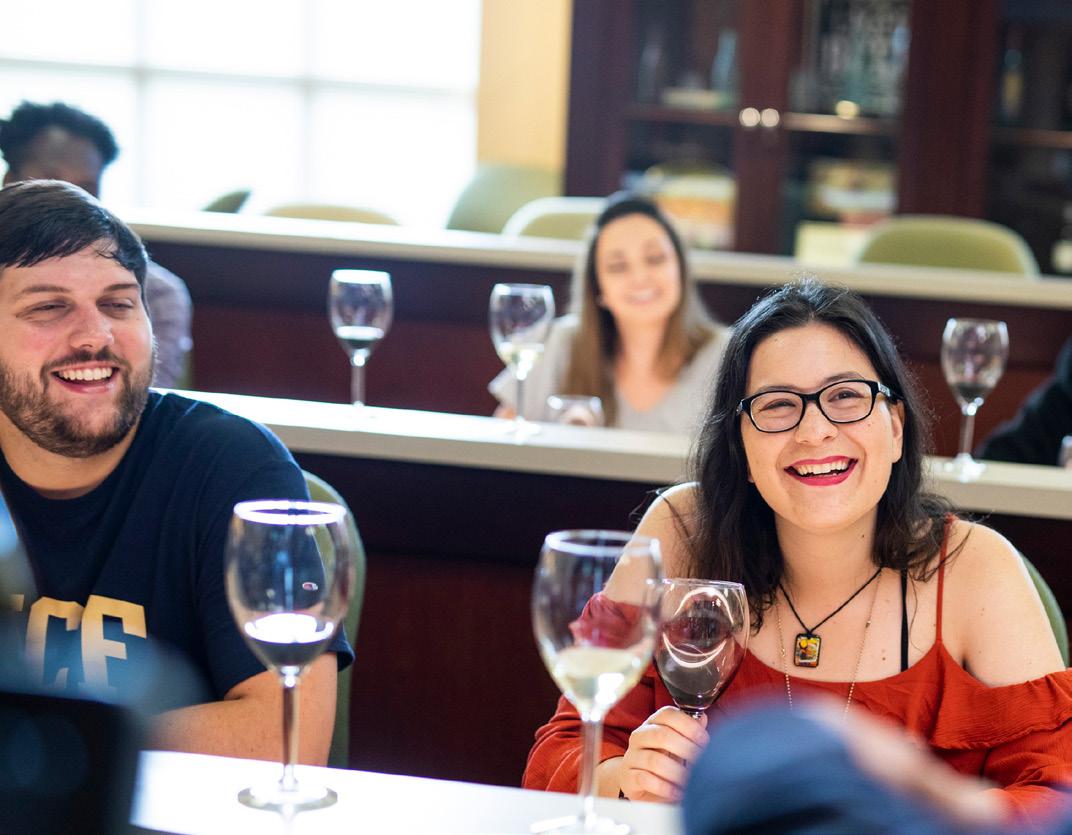
The 300,000+ square-foot, state-of-theart, Mediterranean resort-style campus, comprising a 159,000 square-foot educational facility, includes professional equipped learning labs that meet the highest standards of the hospitality industry. The institution offers a comprehensive curriculum with a combination of general and specialization programs.
problem-solving skills. “If they are trained to have these foundations, they can be easily trained for more specialized and specific tasks,” elucidates Dr. Wang.
UCF Rosen College of Hospitality Management continually strives to stay ahead of the curve. While the world grappled with achieving some form of normalcy after Covid-19, most educational institutions struggled with going digital. When explicitly catering to the hospitality sector, the challenge is to strike a balance between high tech and high touch, as face-to-face human interaction in this industry is pertinent. The entire education system will be shifted towards more self-driven and self-paced learning, and one needs the right tools and capabilities to unleash its potential. UCF Rosen College is already a leader in this domain as the institution, for the last two decades, has been engaged in online teaching and learning supported by a very robust digital learning system provided by the university. The institution continually aims to innovate and maintain its leadership position in this domain. So, UCF Rosen College is gradually increasing its hybrid mode as this will provide choices and flexibility to students while maintaining face-to-face interaction.
Since its inception, UCF Rosen College has been deeply invested in delivering quality education. Highly experienced and trained faculty plays a pivotal role in achieving this. The faculty members of the college represent 18 different countries. They are known worldwide for their research, teaching skills, and the professional experience they bring to the classroom from their years of working in the hospitality industry. “Many of our faculty have served in executive roles in lodging,
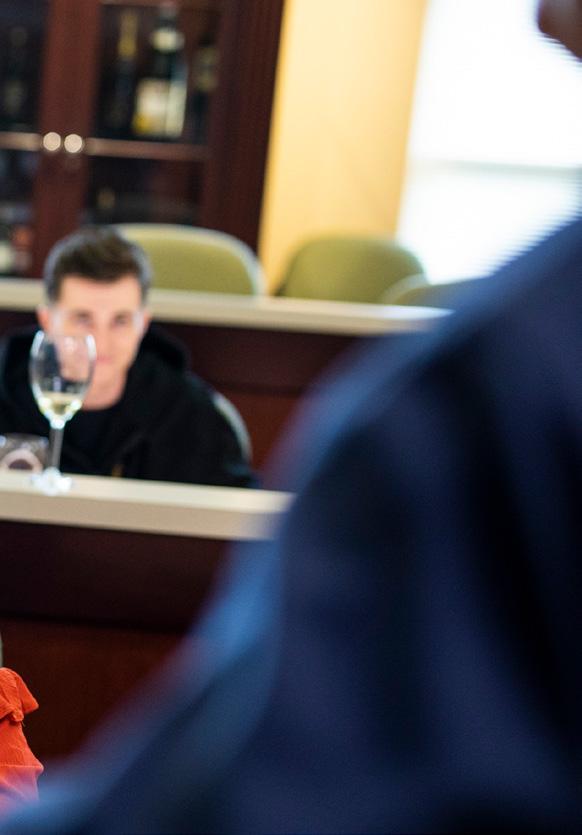
restaurants, theme parks and attractions, themed events, sports, festivals, and the entertainment industry,” informs Dr. Wang. Additionally, each degree program has a dedicated advisory board comprising industry leaders that extend advice on various issues, including curriculum development, guest speaking opportunities, adjunct teaching opportunities, and industry engagement events such as training workshops and continuing education programs. “While we monitor and assess needs at present, we must keep an eye on the future in terms of trends and patterns so that we can be more proactive rather than reactive in leading curriculum development,” adds Dr. Wang.
Dr. Wang tells us how the institution is devoted to creating the perfect learning environment. He says, “Rosen College is an international program; thus, international collaboration is a crucial mission of our college.” Rosen College has on-boarded many international partner institutions to create opportunities for student exchange programs, study abroad programs, international student recruitment efforts, faculty exchange and sabbatical opportunities, and so on. “The goal is to make sure that graduates from the College are global citizens with well rounded worldviews and nuanced understanding of different cultures which play vital roles in the global hospitality and tourism industry,” reveals Dr. Wang.
Simultaneously, the institution serves as an arm of the international hospitality and tourism companies as an educational program provider or consultants for their business development and operations, such as projects in Saudi Arabia, UAE, Japan, Colombia, and Mexico. Rosen College
Each degree program has a dedicated advisory board comprising industry leaders that extend advice on various issues, including curriculum development, guest speaking opportunities, adjunct teaching opportunities, and industry engagement events such as training workshops and continuing education programs. They engage with students and faculty on a regular basis.

constantly organizes and hosts international conferences such as the World Research Summit to maintain the global leadership role in knowledge creation and dissemination.
Rosen College treats innovation and entrepreneurship as a culture and has been emphasized in the programs offered. It is also a culture adopted in student engaging activities that stimulate innovative thinking and increase productivity. One such event is the studentorganized, faculty-led, and industry experts-
guided Career Fair.. “We have a twice a year Career Fair planned and produced entirely by students, which attracts about 150 employers (face-to- face and online) and 700 students and alumni seeking full-time and part-time jobs and internships. We even appoint students to create social media posts to promote innovation regularly. The pop-up food class is another example of promotion of innovation and entrepreneurship,” states Dr. Wang.
On the entrepreneurial side, the college has been formulating various platforms to promote the culture and the entrepreneurial spirit, such as the Innovation and Entrepreneurship Competition. For this event, students work in teams to devise innovative ideas to solve an industry problem or conceptualize and introduce new products to the market. Future plans include a podcast managed and facilitated by students focusing on entrepreneurship, the Entrepreneurial Speech Series, the Entrepreneur in Residence Program, the Global Center of Innovation and Entrepreneurship, and the Culinary and Food Business Center.
Furthermore, there are more than 20 registered student organizations for students to engage with, including the Future Theme Park Leaders Association, National Society of Minorities in Hospitality, Meeting Planners International, and the Wine Club, just to name a few.
While most students have well-placed academic and career goals, some require financial aid to make their dreams a reality. Empowering such individuals, UCF Rosen College awards more than $225,000 USD in scholarships each year that can be applied for by new/incoming and current students. These
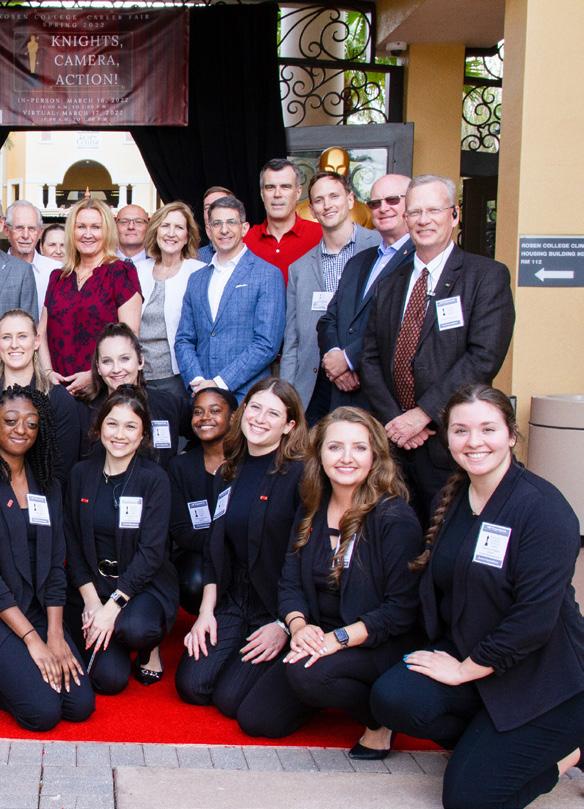
UCF Rosen College of Hospitality Management, located in Orlando, Florida, #1 tourist destination in America, offers students an unrivaled opportunity to learn and work in the heart of hospitality.
scholarships are supported by the institution’s industry partners. Scholarships are also available to master’s and Ph.D. students. Scholarships are awarded based on academic criteria and any combination of financial need, campus/community activities, leadership positions, and work experience.
Stepping Out into the World UCF Rosen College has been helping individuals transition from student life to becoming
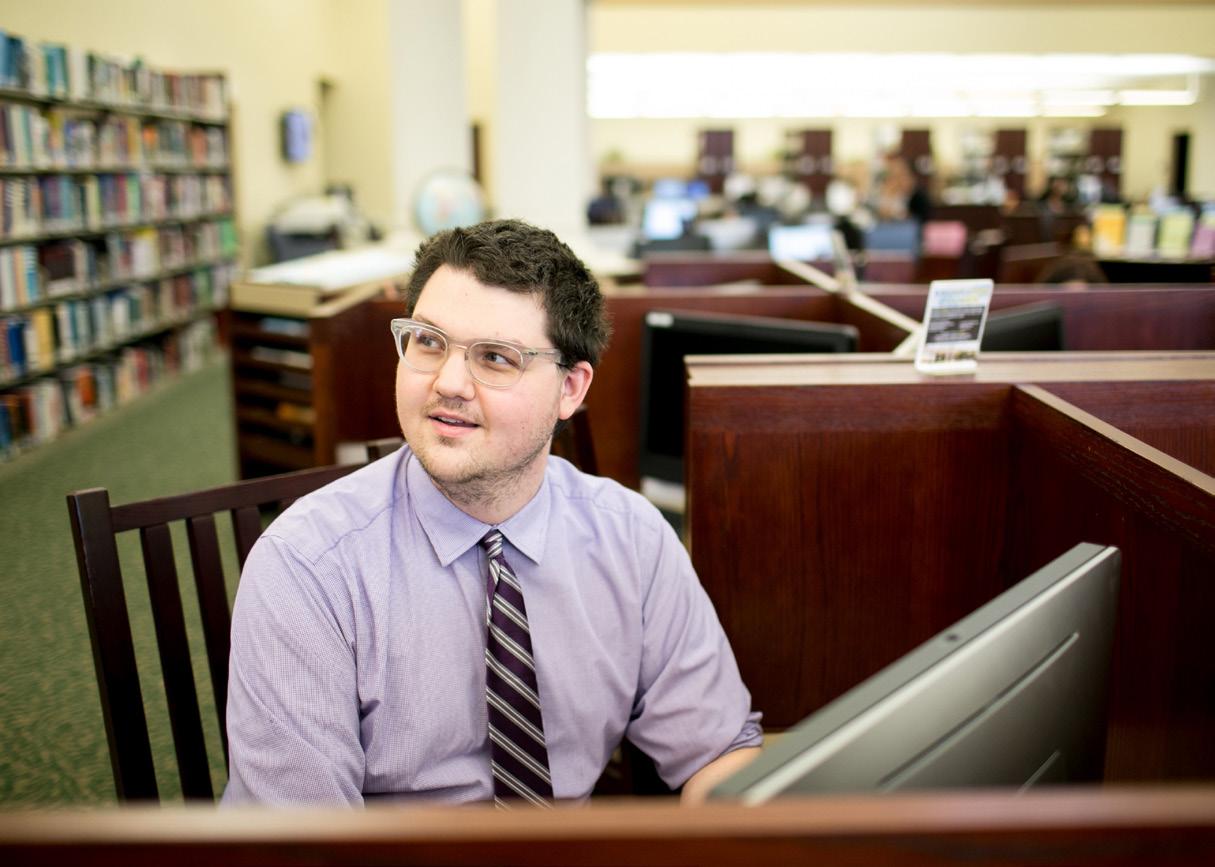
professionals through its robust internship programs. The college boasts of 99 percent of the students bagging jobs upon graduation. More than 1,000 students participate in the internship program each semester.
The students intern in all 50 states and nine countries around the globe, including Australia, Costa Rica, Israel, Japan, Panama, and Spain. Many students are hired on by their internship employers. The college’s twice-a-year career fair for students, connects them with over 100 industry partners across the country and globally. Dr. Wang adds, “Most of our students/graduates work for the following hospitality industry partners: Walt Disney World Resort, Universal Orlando Resort, Marriott, Rosen Hotels & Resorts, and Entertainment Technology Partners.”
The institution enjoys the industry presence it commands today, owing in large part to the generosity of local hotelier Harris Rosen, who donated the initial 18 million dollars in money and land that jumpstarted the construction of the new campus. Soon, many other central Florida hospitality companies — including Walt Disney World, Darden Restaurants, the Universal Orlando Foundation, SeaWorld, Marriott, and the Central Florida Hotel & Lodging Association — were also contributing funds to the project. Since its establishment 18 years ago, UCF Rosen College has graduated more than 12,500 students. Dr. Wang proudly declares, “We educate the future leaders of the hospitality industry. We are not only preparing our students for their first career, but we are also preparing them
for a lifetime of service in a global industry. We are here to fill our students with our core values of Professionalism, Leadership, and Service, which promotes the culture of excellence, inclusion, social responsibility, and hospitality.”
In the past two decades, Rosen College has thrived despite adversities and continues to move forward. The college can be a disciplined student when needed to learn and grow. Dr. Wang tells us that the pandemic taught them many things, and one of the most important takeaways for him was to ensure the team was mentally and physically healthy. As part of the exercise, the college has created new mental health and wellness courses. The team will also be releasing culture/climate surveys to its faculty, staff, and students to better assess where the college stands.
As a college within the University of Central Florida, UCF Rosen College follows the university’s lead in assessing a return to ‘normal’ operation. Until then, the college intends to implement a hybrid work schedule, including remote work hours and standard on-campus hours, as students have become accustomed to having access to staff and faculty outside of normal business hours. Dr. Wang concludes, “We understand that the Covid situation is not behind us completely, but we also understand that we must educate the future leaders of the industry and become the global center of hospitality education, research, scholarship, and industry engagement. Of course, we will achieve all these goals in a safe and considerate manner with flexibility and accommodation provided, if necessary, to create the best experience for all our constituents.”
An educator, engineer, entrepreneur, and community leader, Nick Suwyn started his software development journey at age ten building computer games for neighborhood children. As a child,hedevelopedaloveformusicandafterhighschoolbegansharing hispassionbyteachingafter-schoolmusicprogramsatelementaryschools aroundthePhoenixvalley.Ashewasteaching,heattendedDeVryUniversityand graduated summa cum laude with a degree in Computer Information Systems. He thenworkedasasoftwareengineerfortwoyearsbeforecombininghisloveoftechnology withhisaptitudeforteachingandjoinedacodingbootcamptoleadtheiracademicteam.Twoyears later,NickfoundedPromineoTechwithamissiontoincreaseaffordabilityandaccessibilityoftechnology education.Today,PromineoTechistheleadingproviderofcodingbootcampstocommunitycolleges andNickservesastheCEO,continuingtoleadinnovationthatforwardseducationalaccess.

Coding bootcamps arrived on the academic scene over a decade ago as an alternative learning pathway to combat an everincreasing skills gap in the information technology industry. Currently, in the United States alone, there is a projected average need for more than 442,000 new IT professionals each year through 2030, with only approximately 115,000 annual graduates from both bootcamps and bachelor’s degree programs, resulting in an almost 74% annual talent deficit.
While the adoption of coding bootcamps by both trade-school-like institutions and public universities has helped increase the talent pool
and battle this growing skills gap since 2011, the most accessible institutions across the U.S., community colleges, have not participated in this movement - until very recently.
Since 2011, coding bootcamps have sprouted up across the world, quickly becoming one of the most recognized training paths for students to break into software development and other IT-related careers. Many of these programs started out being offered through private post-secondary institutions with a trade-school model focused on teaching the hands-on skills and technologies necessary
Since 2011, coding bootcamps have sprouted up across the world, quickly becoming one of the most recognized training paths for students to break into software development and other IT-related careers
to build software, while omitting traditional theory that extends the length of many degree programs. The typical philosophy surrounding coding bootcamps has been to teach industrystandard tooling and methodologies in 6 to 36 weeks to enable reskilling adults to hit the ground running in a new technology career, all while increasing the affordability of education.
The word bootcamp is used to describe the intense nature of these short-term programs. While some of the typical computer science degree theory may be ignored, coding bootcamps still have a myriad of content and learning to cover. This includes everything from exploring how to set up a software development environment and writing one’s first line of code to deploying functional applications and making contributions to real world projects using the most up-to-date technologies – quite a feat for only a handful of months learning.
The average student attending a coding bootcamp also differs somewhat from the traditional degree-seeking student. While some recent high school graduates enroll in bootcamps, most attendees tend to already have at least a handful of years of experience working in an unrelated industry and may have even already attended college or a trade school. The draw to these alternative training programs is the ability to transfer existing professional skills acquired throughout their current career and combine them with newly gained technical skills to pivot into a different industry without needing to return to college for another degree, which might take years to complete.
While coding bootcamps started out mainly through private institutions, after a few years, universities saw the value of these programs
While coding bootcamps started out mainly through private institutions, after a few years, universities saw the value of these programs and began partnering with providers to offer co-branded or white labeled coding bootcamps of their own
and began partnering with providers to offer co-branded or white labeled coding bootcamps of their own. This new partnership model helped chip away further at the IT skills gap by increasing both the visibility and accessibility of these rapidly growing programs. Universities were able to leverage their brands, combined with the proven success of existing coding bootcamp programs, to forward the industry of alternative learning pathways and help more students access critically needed technology education.
With universities adopting the coding bootcamp paradigm, employer recognition of these programs increased, and, combined with the gravity of an exceptional talent deficit, led to an accelerated decline in traditional requirements for a bachelor’s degree to begin a career as a software developer.
However, while making coding bootcamps more recognizable to both employers and students, traditional universities have not always been viewed as the most accessible institutions by everyone. This barrier left vital
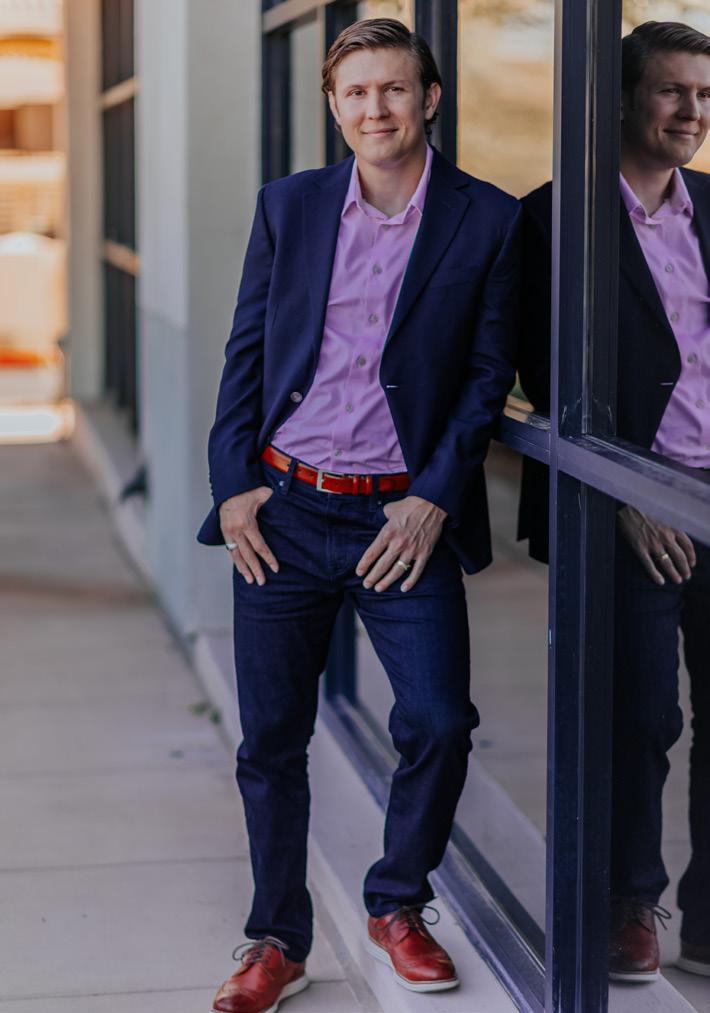
education just out of reach for many of the population, but also highlighted an opportunity to be unlocked.
Recently, many institutions have struggled with traditional enrollment, and community colleges are no exception. From 2010 to 2030, community colleges are being challenged with a decline in enrollment of approximately 2.1 million credit-seeking students. This,
combined with the need for more accessible coding bootcamps, became the catalyst leading community colleges to adapt, innovate, and figure out how to participate in the now decadeold effort to bring technology education to the masses.
While earlier years from 2017 to 2019 saw one-off community colleges launch their own coding bootcamps, 2020 saw the first spike in adoption with 9 additional colleges partnering with providers to join the
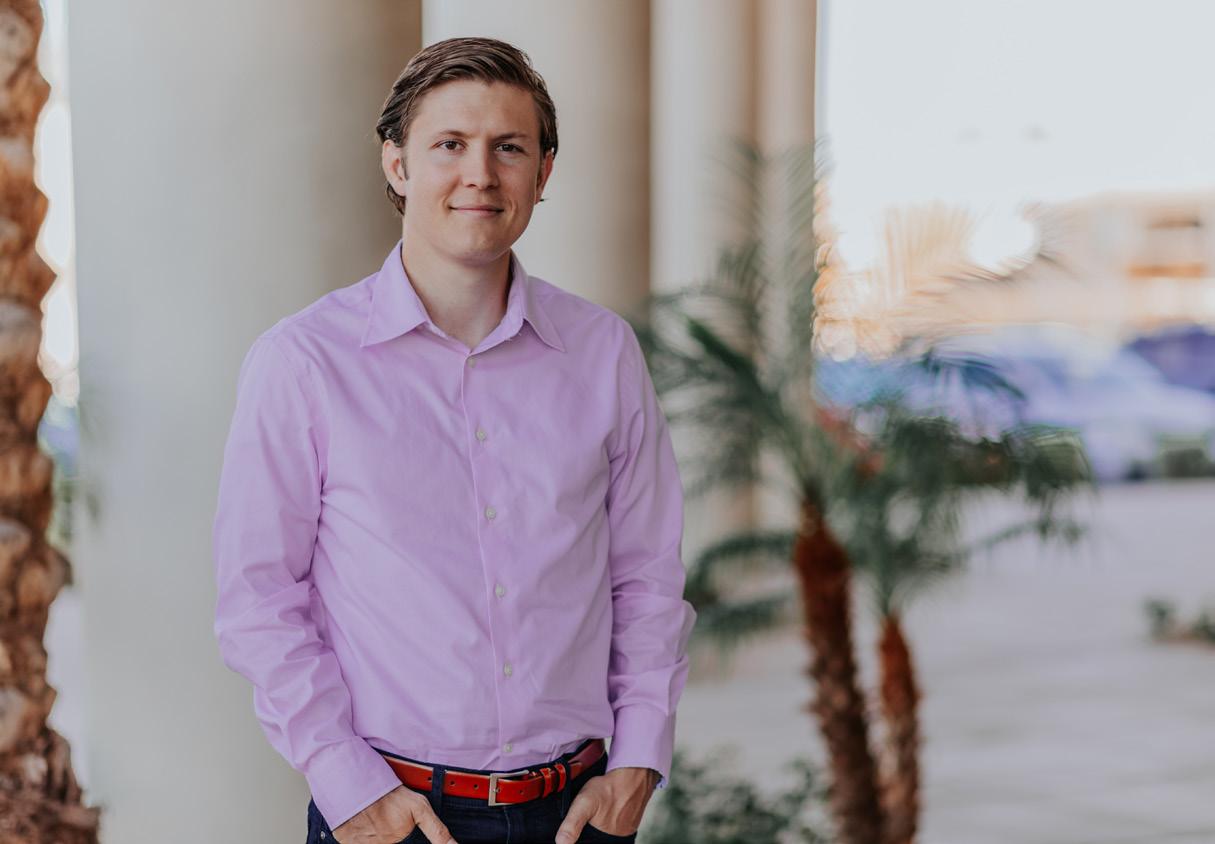
movement. The following year saw another exponential increase with 29 new community college coding bootcamps taking the stage, and the trend looks to be continuing. Of the providers that work with community colleges to launch these bootcamp programs, Promineo Tech is notable for leading the movement and accounts for more than 41% of all partnerships. Not only has the acceptance of this model benefited community colleges through increased enrollments and tuition, but by embracing coding bootcamps these colleges have expanded the inclusivity implicit to their brands onto the bootcamp industry.
Inclusive brands aren’t the only method community colleges have employed to increase accessibility, though. The average community college coding bootcamp costs around $3,600, compared to the industry average tuition of approximately $13,500. Through innovative partnerships and optimized delivery of education, community colleges have decreased the cost of these bootcamps, made life-changing instruction more accessible, and positioned themselves to become the leading institutions offering these modern reskilling opportunities.
As technology evolves at an exponential rate, the IT skills gap continues to expand. Society and education are doing everything they can to keep up with the increasing needs, which has led to innovation across workforce development and training. Because of the rapidly changing landscape, bootcamps, micro-credentials, stackable credentials, and industry certifications have increased in
popularity and credibility. The need for very specific, short-term, skill-based training has become more apparent as industry standards change in the blink of an eye with the goal of continual progress.
Because of the rapidly changing landscape, bootcamps, microcredentials, stackable credentials, and industry certifications have increased in popularity and credibility
Community colleges have long been a hub for workforce education and training, and with previously degree-requiring careers like software development transitioning to a more hands-on training model, the adoption of coding bootcamps makes incredible sense. With the way the industry is trending, the future of workforce education will be driven by accessible, affordable, and alternative models, and community colleges offering these programs will be at the forefront of building that future.
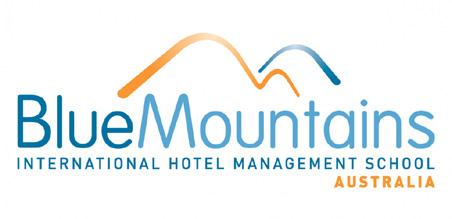
Website: Location: Sydney, Australia
Website: Location: Lausanne, Switzerland
Keyperson: Dr. Gregory Harper, Pro Vice-Chancellor, Business and Hospitality
Admission:
https://www.torrens.edu.au/blue-mountainshotel-management-school https://apply.torrens.edu.au/
Keyperson: Inès Blal, Executive Dean
Admission:
https://www.ehl.edu/ https://www.ehl.edu/en/admission-fees
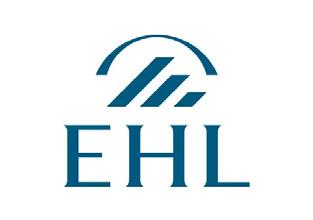
Website: Location: Hague, Netherlands
Website: Location: Lagos, Nigeria
Keyperson: Regine von Stieglitz, President Admission:
https://www.hotelschool.nl/ https://www.hotelschool.nl/apply/
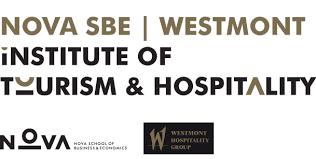
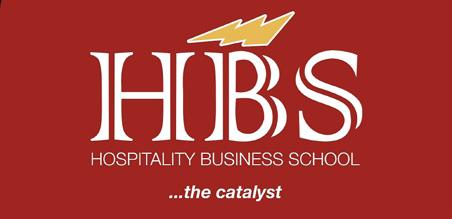

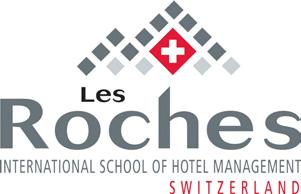
Website: Location: Crans-Montana, Switzerland
Key Person: Mr. Giovanni Odaglia, Dean of Students
Admission:
Keyperson: Dr. Mekwuye Eric, CEO at HoReCaBB Mentors (HM) and a Chief Faculty
Admission:
Website: Location: c
Key Person: Sérgio Guerreiro, Executive Director
http://horecabbmentors.com/hbs.aspx http://horecabbmentors.com/HBSform.aspx https://lesroches.edu/ https://lesroches.edu/apply/
http://novasbe.unl.pt/ http://novasbe.unl.pt/
Admission:
Website: Location: Queenstown, New Zealand

Website: Location: Florida, USA
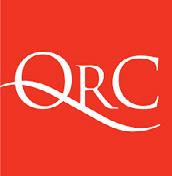
https://www.qrc.ac.nz/ https://www.qrc.ac.nz/admissions-process/
Key Person: Charlie Phillips, CEO Admission:

Website: Location: Dubai, United Arab Emirates
Key Person: Frederic Bouchon, Dean

Admission:
Key Person: Dr. Youcheng Wang, Dean Admission:
Website: Location: Nevada, USA
https://hospitality.ucf.edu/ https://www.ucf.edu/admissions/ http://www.emiratesacademy.edu/ http://www.emiratesacademy.edu/about/ emirates-academy-of-hospitality-management/
Key Person: Stowe Shoemaker, Dean
Admission:
https://www.unlv.edu/hospitality https://www.unlv.edu/hospitality/admissions

Today’s learners and faculty have high expectations, requiring an integrated and exible learning experience that operates seamlessly and intuitively. By partnering with Blackboard, you can enhance your institution’s brand by providing students and faculty with a holistic and integrated modern learning ecosystem.
Blackboard brings together the technologies and services you need to lead your institution through this digital transformation.
To learn more, visit blackboard.com

After numerous lockdowns, quarantining, and restricted travel, industries today recognise how important different features of their work are. As one of the most affected areas of business, the tourism industry has struggled to jump back on its feet. Education, too, has faced challenges, and tourism education has seen a significant setback. In today’s business scenarios, international hospitality education has become imperative to make a lucrative career in the post-pandemic world. Featuring one of the 10 Must Watch International Hospitality Management Institutes - 2022 from Nigeria is Hospitality Business School, Lagos, a place for budding hoteliers, chefs, restauranteurs, hospitality business owners and experienced hospitality workforce who desire to upgrade their skills.
The Hospitality Business School (HBS Hotel School) is a great choice for all interested in world-class hospitality education, especially those desirous of seeking abroad.
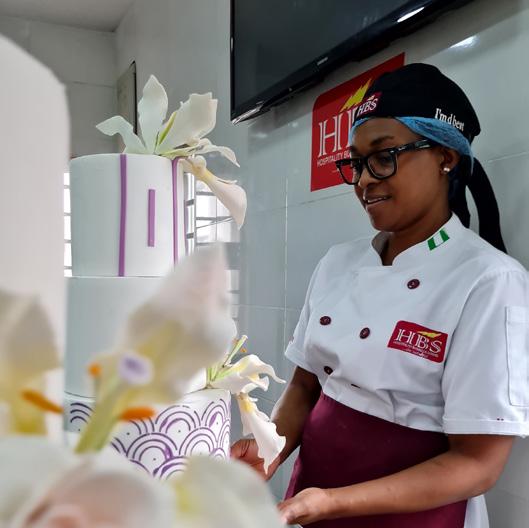
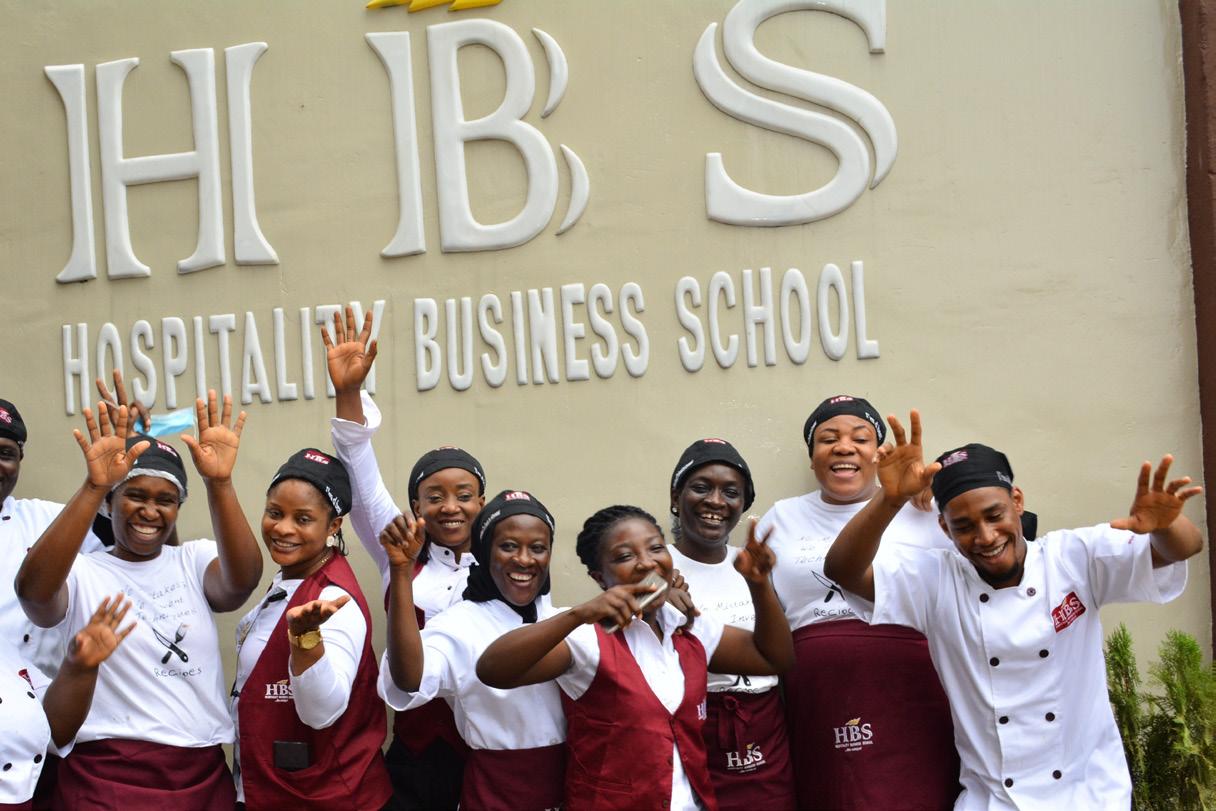
The Hospitality Business School (HBS Hotel School) is an excellent choice for all interested in world-class hospitality education. Programmes are administered by multiple accredited international faculty in a real-life state-of-the-art facility situated in the heart of West Africa, Lagos, Nigeria.
The world-class hotel school programmes offer more without the costly sacrifices associated with studying abroad to hospitality investors, the workforce seeking an upgrade, school leavers interested in hospitality and others seeking a switch in their career.
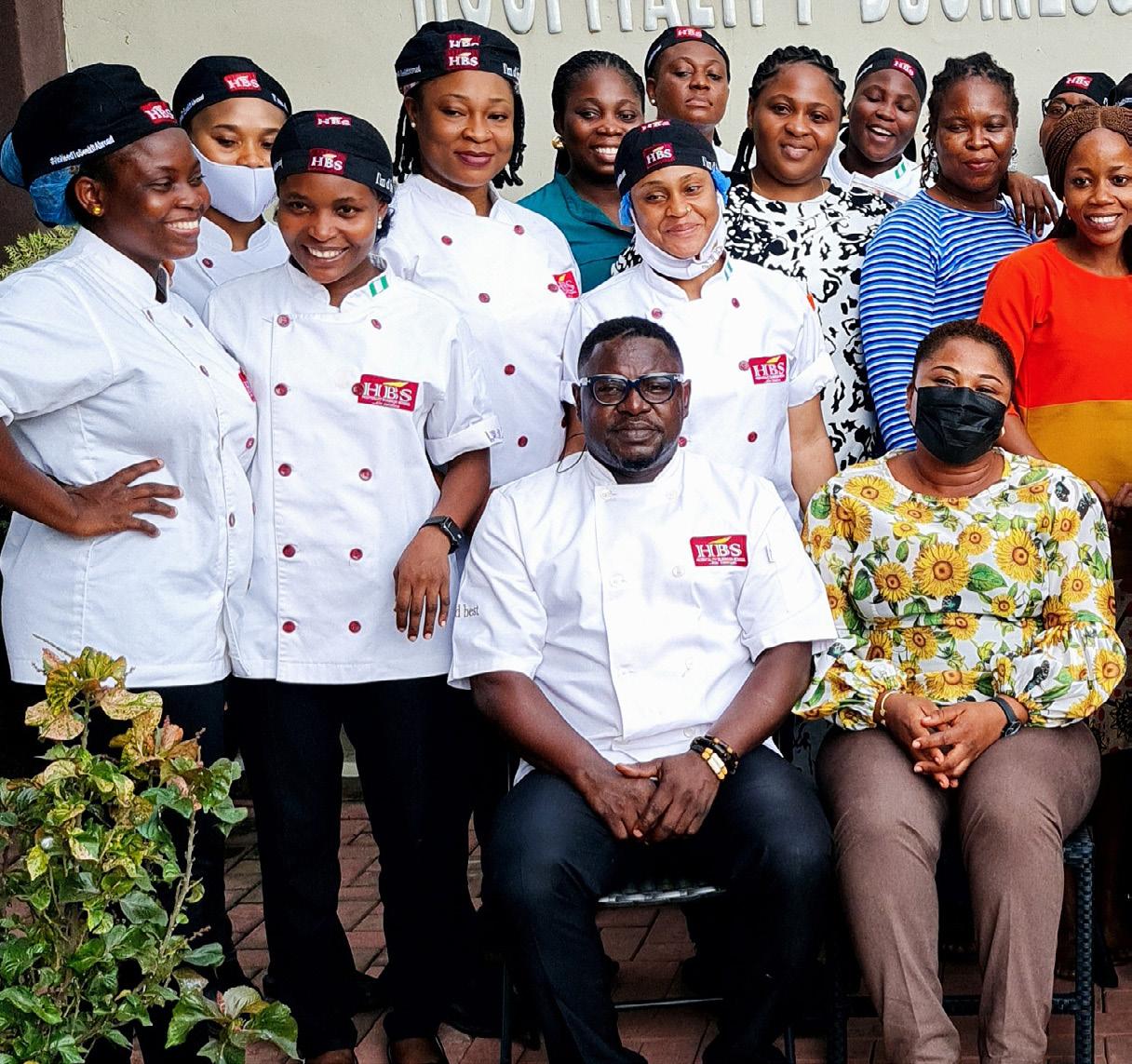
In line with the knowledge of the hospitality industry’s needs and with the passion for releasing result-oriented students, the courses at HBS are primarily hands-on practical in real-life, individualised and well-equipped facilities. Inside the HBS is
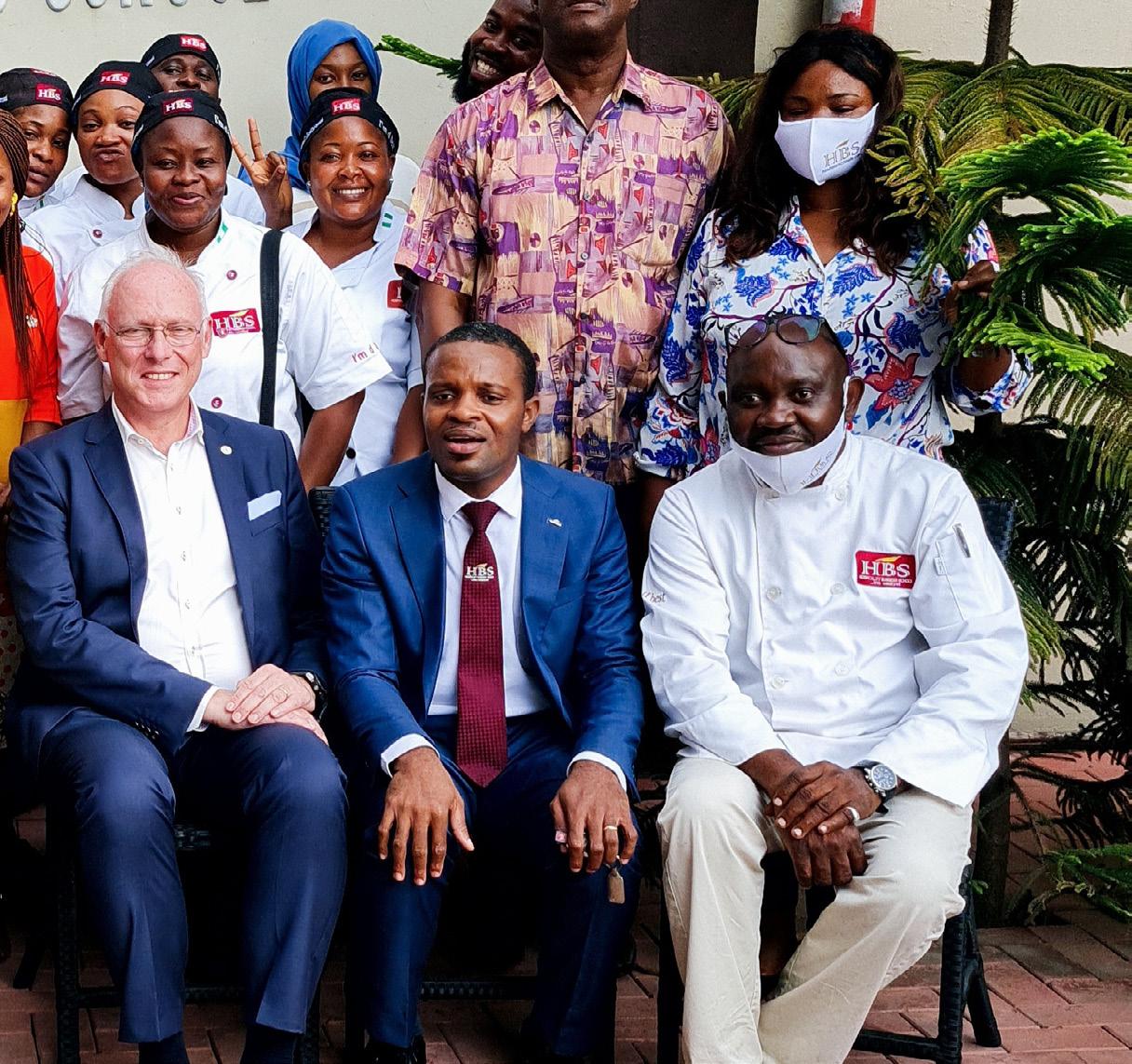

Programmes at HBS are administered by multiple accredited international faculty in REAL-LIFE stateof-the-art facility situated in the heart of West Africa, Lagos, Nigeria.

a fully individualised audio-visual Kitchen for the School of Culinary Arts, an amphitheatre audio-visual Business Class for the School of Entrepreneurship and Management, a fully individualized audio-visual kitchen for the School of Patisserie and a fully individualised audio-visual Bar & Lounge and fully individualized Bar for School of Bartending and Wine study. Students will also find an academic paradise with a syndicate room audio-visual Business class for the School of Entrepreneurship and Management.
To keep the students up to date with the industry trends, the college has a fully furnished hotel room for hotelier housekeeping practice, a standard hotel front desk for hotelier Front office practice, and a see-through fully furnished audio-visual theory class for schools
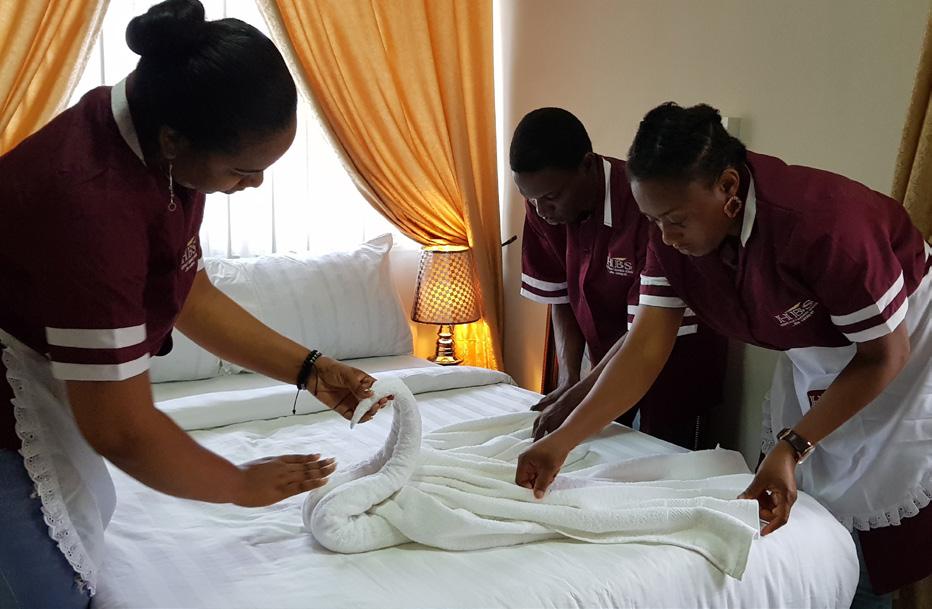
of Culinary Art and Patisserie. It also houses a purpose-built Barbeque pit for the School of Culinary Arts, a ‘Chameleon restaurant floor’ with a variety of furniture to set up variety of Restaurant concepts; for the School of Entrepreneurship and Management and an Alfresco for general student’s hangout and for School of Entrepreneurship and Management. HBS provides fully furnished apartments/ rooms and hostel/dormitory facilities for outof-station students.
“Importance of collaboration between industry and academics cannot be overemphasised as almost all today’s students are industry people tomorrow; so collaboration to bridging knowledge and industry practice shouldn’t be optional but a MUST,” shares Dr. Mekwuye Eric, CEO at HoReCaBB Mentors
(HM) and a Chief Faculty, Hospitality Business School, Lagos. He adds, “At the HBS, we are very intentional in maintaining a documented relationship with hospitality brands and are willing to go with more reputable institutions around the globe.”
Recent collaborations for student industry practice and internship include but are not limited to Sheraton hotels Lagos, Black Bell Lagos, Eko Hotels & Suites Lagos, Eric Kayser Lagos, BWC Hotels Lagos, Golden Tulip Port Harcourt, Radisson Lagos, Association of Professional Chefs Nigeria (APCN), Women in Nigeria (WIHN), Global Foodservice
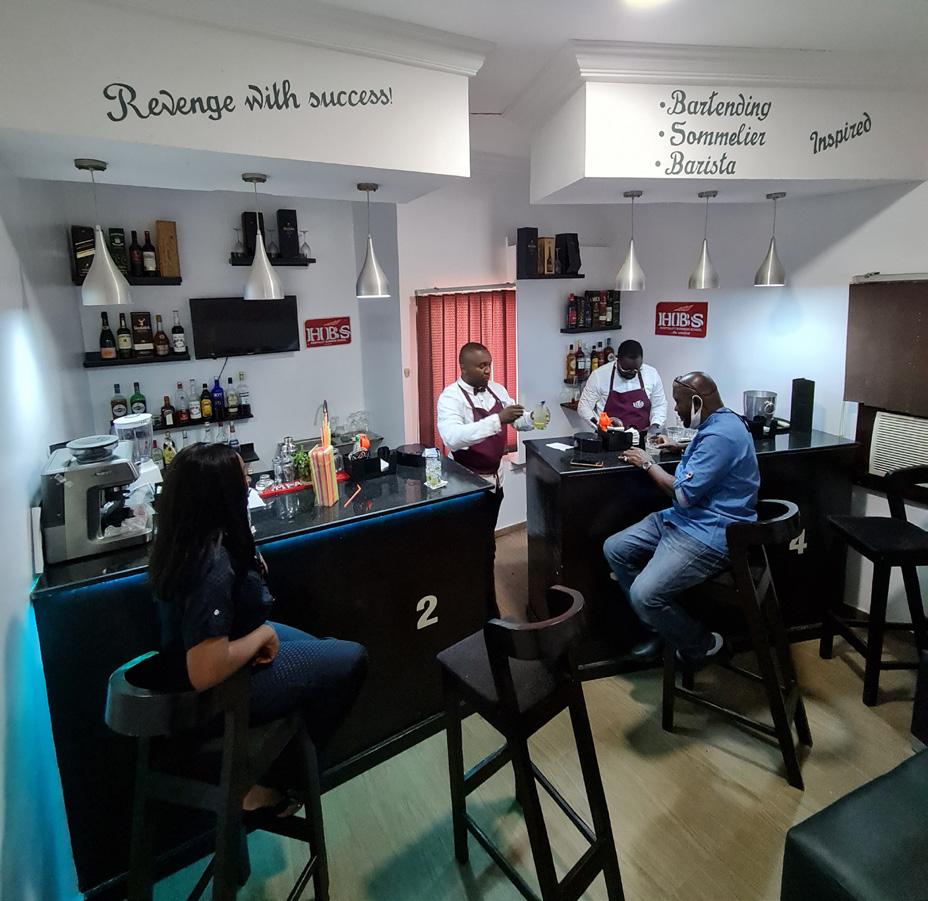
Initiative, USA (GFI, USA), Chefs Association of Ghana (CAG), (Hospitality And Tourism Association of Nigeria (HATMAN), Best of Gastronomy, France.
“Understandably, our industry placements (internship) are for budding hoteliers, chefs and restauranteurs. We record 100 per cent placements, and as a matter of fact, hospitality brands are constantly on queue for both internship and recruitment,” informs Dr Mekwuye. Currently, HBS has interns in Radisson hotels, Eric Kayser, Golden Tulip, Eden life, BWC hotels, Sheraton hotels & Towers etc. “As of date, through
our “Fish from the pond”, we have almost 10 students on part-time work (Wednesdays to Sundays) since the school runs Mondays to Wednesdays. For these brands, that’s a strategy for picking the students ahead of others,” he adds.
As a matter of policy, a top criterion for HBS faculty members is extensive handson industry experience, international exposure, passion for passing knowledge and possession of teaching skills. One of the reasons is simply that they teach not ‘bookknowledge’ but based on passage knowledge.
As a student at HBS, learners understand that Respect-for-the-Individual is a part of their core values and culture. “It is based on
our knowledge that hospitality industry is built on hospitality itself; also that hospitality jobs are hard and time-consuming, developing the culture of having fun responsibly while delivering is key to building a successful career,” shares Dr. Mekwuye.
The Hospitality Business School, Lagos, believes so much in creativity. They advocate and practice teaching principles and techniques that help students grow their creative minds. For instance, the School of Culinary Arts has a carefully designed curriculum that allows the students to express their creativity and understanding of principles and techniques learnt through carefully organised #HBSStudentCookingCompetition, studentled classes, #HBSLagosExpressYourselfDay, and HBS Fusion Cooking.
The world-class hotels school programme of HBS offers more without the costly sacrifices associated with studying abroad to both hospitality investors, workforce seeking upgrade, school leavers interested in hospitality and others seeking career switch.
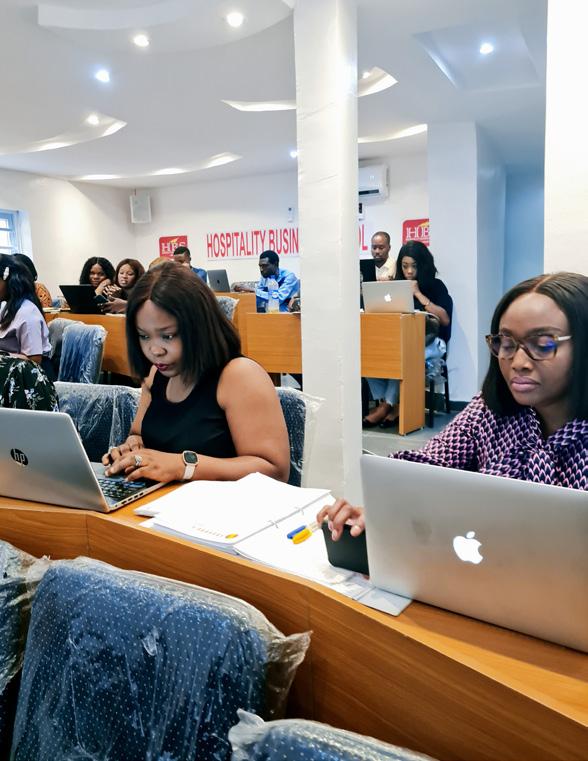
In the free restaurant set-up course, all HBS professional diploma students will get to set up a restaurant organisational structure that will assign roles/tasks based on a chosen restaurant and bar concept. They go through the entire gamut, including pre-opening and eventual operation with live dinners at various restaurants, lounges and bars inside the school for profit and loss, by themselves! “The idea is simply to expose them to the
The HBS F&B service and Restaurant Management is designed to teach the requisite skills, knowledge and to inspire consistent delivery, exceptionally.
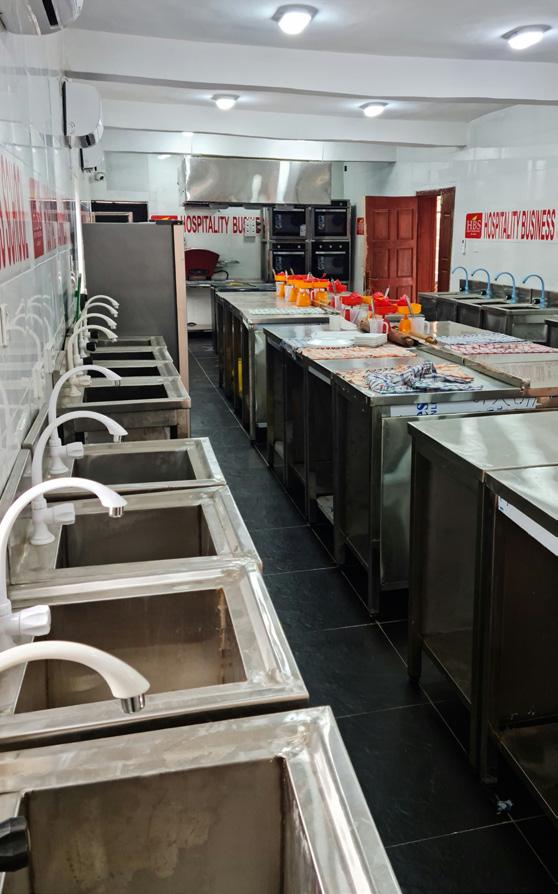

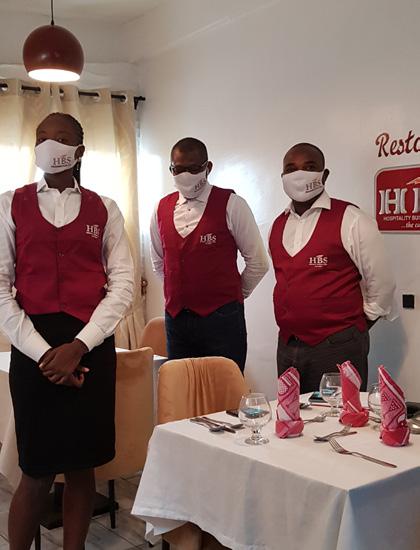
reality of setting and running an F&B business, just so we raise more entrepreneurs and Intrapreneurs. And the result has been phenomenal – over 10 restaurants opened by our Alumni members within 4 years both Nigeria, USA; and numerous doing well as employees (Intrapreneurs) across the world including Canada,” informs Dr Mekwuye.

In line with HBS’s philosophy of giving more than bargained for and getting students industryready, all professional diploma learners get the additional courses for free. It is fully sponsored by the #HBSLagosScholarship. This includes the HBS
Food Safety post-covid-19, which is separately certificated, and the HBS Mini-MBA, which includes modules 1 and 2 of the 16-module course. HBS also provides a basic restaurant setup course and the opportunity to join fellow students to set up and run the HBS Chameleon restaurant, al fresco dining and Bar & lounge for profit and loss. The college insists on food handlers test for ALL its students, with medical report and certificate issued and this is fully funded by the #HBSLagosScholarship. The students also get opportunity to engage in Cooking competition with prizes and a direct membership opportunity to join various professional associations in partnership with the HBS.
With a Mission to build worldclass professional education with a cutting-edge solution and a vision to join the league of the world’s top 5 (five) preferred professional hospitality education centres with Alumni members setting the world’s record in global top hospitality brands, HBS has genuinely deserved its place in being one of the best hospitality colleges in the world.
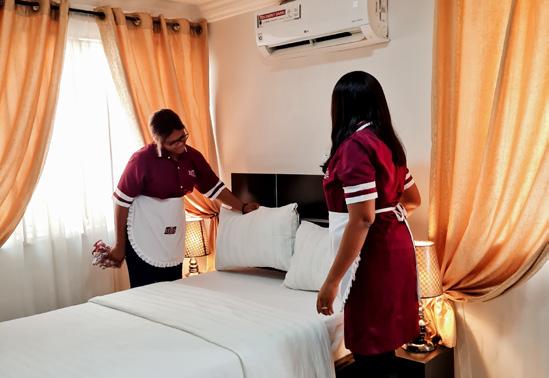
Dr. Hans A. Andrews (Distinguished Fellow in Community College Leadership at Olney Central College, Illinois) and
Dr. John Erwin (Former President of Illinois Central College)
Dr. Hans A. Andrews is the Distinguished Fellow in Community College Leadership at Olney Central College in Illinois, U.S. He is the former President of the college.
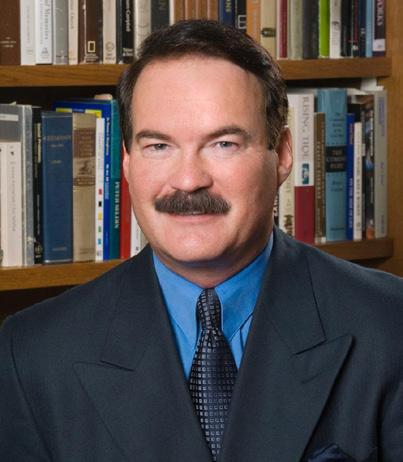
Dr. John Erwin is former President of Illinois Central College. He is also the former Vice President of Instruction for Cincinnati State Technical and Community College.

The need for meaningful teacher evaluation was mentioned several times. The evaluators, they felt, needed to confront teachers with the problems when they are identified in their evaluations
Some years ago, Dr. Hans A. Andrews and Dr. John Erwin conducted a survey of student leaders from Illinois, U.S., community colleges. The student leaders had been invited to attend a statewide workshop. The Illinois Community College Board had helped us by identifying the students who were a large part of their student advisory board that year.
Question on high quality and/or lowquality teaching reported
The first question we asked was how they felt about the quality of teachers they had been experiencing in their colleges. These student leaders, knowing that their names would not
be made public, were very honest as well as blunt in their responses to the questions that we posed to them:
Students reported the following: Number of ‘high quality’ teachers they had to date in their community college: 12, 7, 6, 6, 3, 3, 6, 5. Some responded in percentages: 33%, 10% and 30%
Number of ‘poor quality’ teachers they had experienced: 3-4, 4, 5, 10, 1, 1, 1, 7, l and 10% and 30%
Question on best and worst teaching methods experienced
Students reported the following as ‘best’ (not in any specific order): Sticking to the course syllabus
Giving encouragement
Interaction between students
Treats everyone on the same level
Asks questions and has interaction with students
Fun/sense of humor
Question on what they considered the ‘worst’ teaching methods: No organization
Incomplete knowledge of the material
Difficult to contact outside of the class No enthusiasm for the material Tests that have information not discussed in class
Lectures strictly from the textbook Constantly late for class
Doesn’t leave his/her personal life out of the classroom
Repeating the same material
Question on how to improve on the poor teaching
Students expressed concerns that the hiring of quality teachers should be taken very seriously. They also suggested having tenure (long term hiring) reevaluated. They felt those teachers appeared to be locked into their schools long-term.
The need for meaningful teacher evaluation was mentioned several times. The evaluators, they felt, needed to confront teachers with the problems when they are identified in their evaluations. Follow-up on these evaluations
The ages of the student leaders we learned from the survey forms ranged between 18 and 50. This survey, unlike most previous, was not limited to a single course of each student
was identified as being necessary to check on whether there had been any progress on the previously identified concerns.
These student leaders were next asked to express their feelings on how they felt when they learned they had a poor teacher for one or more of their classes. They continued to respond openly and honestly:
“I feel outraged and upset since me, or my family is paying for the class and the school fails to provide a qualified instructor!”
“Worse than losing the money is when you learn that you have to have the same poor instructor for another class.”
“I am disgusted that I wasted my time and money on this class.”
“Mad as hell! Not only was it a waste of time and money, it is a rip-off of students and families who do not have the money to lose.”
This is a sampling of the responses received. There was, indeed, a great deal of frustration in having a poor instructor assigned to one or more of their courses.
This was an important question for us to learn what happens when students try to get school leadership involved in improving the teaching they have been experiencing. The following are direct quotes that helped highlight the frustration these students often had felt.
“Yes! The supervising administrator cordially took notes and indicated the instructor would be talked to. Then nothing happened!”
One student reported that it did lead to one of the instructors being dismissed from the school and the contract was not renewed.
“Our administrator indicated that he could not write the teacher up on the same charge twice. That seems quite stupid when you consider he had a class of 25 students who were dissatisfied.”
This opportunity to survey the experiences of our community college student leaders was rare. They identified that almost all of them had experienced both high quality and some low quality teachers in their colleges.
One of the reasons this was successful and provided honest response was our guarantee of confidentiality at the time of the survey. This was very important because these student leaders may have additional classes with these same instructors they were discussing.
The ages of the student leaders we learned from the survey forms ranged between 18 and 50. This survey, unlike most previous, was not limited to a single course of each student.
This survey did show that there were many excellent teachers in the community colleges throughout the state. It also brought attention to the need to improve evaluations of the teachers. If those teachers being evaluated as doing a poor job persisted it was brought out that the students felt they should be removed.
These survey results were shared with the leadership in each of the 50 state community colleges. What was learned, and reinforced, was the fact that the quality of teachers did, indeed, affect the students.
David Parker, Author of Income and Wealth and A San Francisco Conservative
David Parker is the author of Income and Wealth and A San Francisco Conservative. In addition to a career in education spanningmorethan40yearsasamusicteacherinSanFrancisco’s public schools. Parker achieved success as one of San Francisco’s leadingrealestateinvestors. Atrue“Renaissanceman,”heisalsoactiveon thecity’sjazzscene,asleaderoftheDaveParkerSextet,whichtwiceheadlined San Francisco’s prestigious Filmore Jazz Festival. In addition to being an author, musician,entrepreneurandinvestor,DavidParker,alifelongresidentofSanFrancisco,is alsoaproudfatherandgrandfather.Heiscurrentlyworkingonhisthirdandfourthbooks,Selected Writings: David Parker Essays Volume 3, and The Environment: David Parker Essays Volume 3.
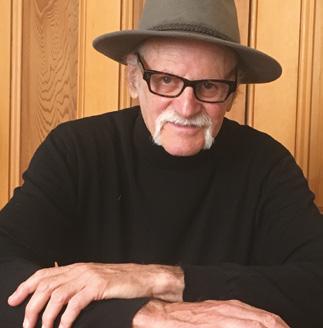
How can some make wise financial decisions with the current life-changing pandemic and volatile economy? What would be your first recommendation to a person seeking your help?
A key to making wise financial decisions, even during times that many consider challenging, is to remember that economic patterns are cyclical. We should find that fact reassuring. There are always opportunities for economic growth – whether that means investing in a carefully chosen stock or joining with a colleague to purchase residential real estate.
If you exercise self-discipline during the years when the economy is strong, you’ll have cash available that will enable you to take
advantage of the right opportunity. My first recommendation, when asked how to create wealth is to become more disciplined about saving money. As I demonstrate in my book, Income and Wealth, even someone working a minimum-wage job can save half their income and become financially independent in ten years--if they make it a must. There is always an unexpected variable operating in the economy – the pandemic, for example. Don’t look for excuses! Just start saving!
Your first book, Income and Wealth, includes business and economic insights carried with you since the age of 12 and provided readers with a
There is always an unexpected variable operating in the economy – the pandemic, for example. Don’t look for excuses! Just start saving!
thought-provoking examination of the foundation on which the nation’s freedom rests. What inspired you to write this book?
At an early age, one of my childhood epiphanies was the realization that “income” is not the same thing as “wealth.” When I was 12 years old, I came across the obituary of a waiter who worked his entire life at the Saint Francis Hotel in San Francisco. He had built a fortune worth millions of dollars on a waiter’s income. That realization, one of three that prompted me to write.
Do you think the pandemic impacted how individuals may pursue that goal of achieving financial independence? What do you think is the focus of Gen Z and Millennials regarding financial independence? When millions of people who had previously spent their working lives in an office of some kind were suddenly ordered to work from home due to the pandemic, and countless businesses were closed, a certain freedom was thrust upon us. People realized they preferred working from home-and sought ways to keep that new-found freedom. I’m not sure we can generalize, but I’ve noticed that many members of the Gen Z and millennial generations are more determined than ever not to hold off on travel and life experiences. Having learned that life can be short, they seem newly inspired to make the most of it—rather than save for the future. Yet, I’m impressed with the compassion demonstrated by these younger generations.
Having learned that life can be short, they seem newly inspired to make the most of it—rather than save for the future. Yet, I’m impressed with the compassion demonstrated by these younger generations
Can you share something about the book that isn’t in the blurb? What do you hope your readers take away from the book, Income and Wealth?
I want my readers to realize that the laws of money and economics are timeless. Babylon and today are the same. Government should not regulate or tax business Those in business always find a way to go around government regulation. The market always goes around. The cost of that evasion is much higher prices and a much lower standard of living, for everyone.
How did Income and Wealth become a favorite subject for someone who spent 20 years as a member of the Berkeley Symphony Orchestra and 15 years as leader of the Dave Parker Sextet? Can economics and creativity co-exist?
I’ve always enjoyed leading several simultaneous careers. For more than 40 years, I worked as a music teacher in San Francisco’s public schools. At the same time, I became an investor and entrepreneur, a writer and a musician. Those simultaneous careers keep me sharp and creative. I like to joke that “I have 150 years of experience!” The famous muralist Diego Rivera understood that the creative artist and the creative industrialist are the very same person.
While pursuing a career in education, you became a very successful real estate investor. So, what exactly motivated you to become a writer? What was the trigger moment for you?
When I first started writing, my wife took one look at what I’d written and said, “I think you’d
better take a class in economics.” So, I went back to school and took 67 units of math and economics (an earned a master’s degree in economics). The same intuition
I have for teaching, playing music, and investing, I have for political economy. For the last 35 years, I have been reading and writing three to five hours a day on that subject.
What does success mean to you? What is the definition of success? Success is the satisfaction of working at a professional level.
Are you working on anything at the present you would like to share with your readers?
I’m working on a collection of essays on a variety of topics – government, history and economics.
As an author, what is the change you want to bring into people’s lives to help their families and communities?
The message of my second book, A San Francisco Conservative, but also Income and Wealth, is that the Founding Fathers got it right: maximum individual freedom, maximum individual responsibility. Government cannot do for citizens what they must do for themselves.
What projects or goals are you working on or leading currently?
I enjoy playing jazz as a member of The Dave Parker Sextet here in San Francisco, several times a month. Come hear us play sometime!

Tourism and hospitality is one of the leading industries in the world. A study conducted by Market Data Forecast predicts this global market to reach a value of 9 trillion Dollars by 2027, growing at an annual rate (CAGR) of 3% during the forecast period. Nova SBE Westmont Institute of Tourism and Hospitality contributes a substantial portion to this growth as their students graduate to become competitive leaders in this domain. The institute is a partnership between Nova SBE and the Westmont Hospitality Group. This partnership was forged to leverage management and leadership skills in the tourism and hospitality industry while preparing young leaders to drive innovative and competitive organizations. The association also aims to support tourism development in Africa by having developed a data platform for Governments and the private sector in Africa (WiTH-Africa.com), supporting
The Nova SBE Westmont Institute of Tourism & Hospitality (WiTH) is a partnership between Nova School of Business and Economics and Westmont Hospitality Group that aims to inspire and support current and future leaders to use the principles of hospitality, to drive innovation and sustainability in customer-centric organizations.

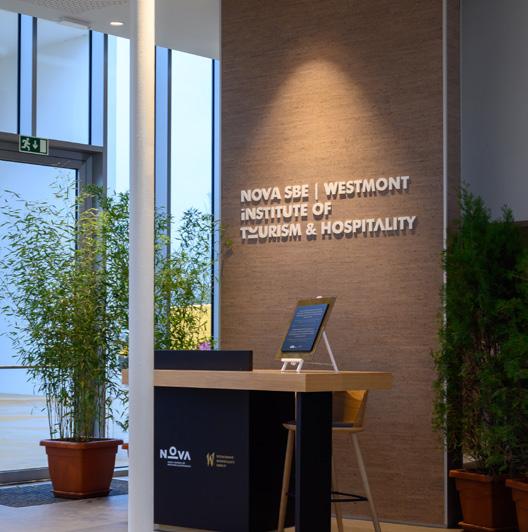
the development of evidence-based sustainable development policies. “Innovation is thus a key element of our courses, sustainability is a core principle of our DNA, and people are our passion. Customers are at the foundation of our strategies,” says Sérgio Guerreiro, Executive Director at Nova SBE Westmont Institute of Tourism and Hospitality.
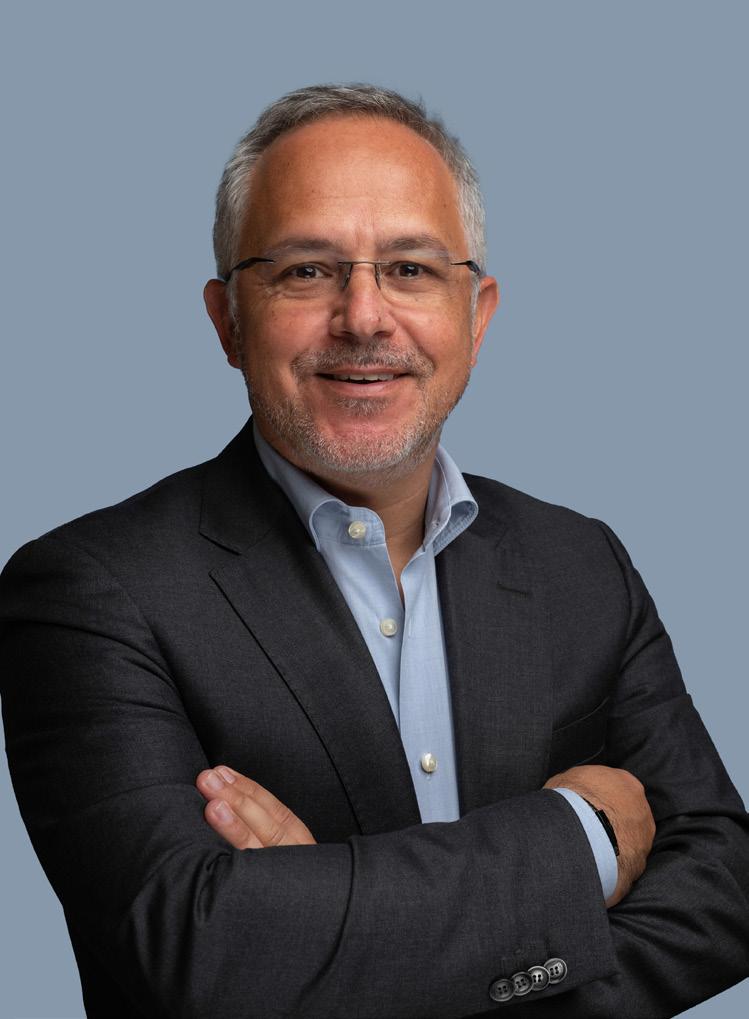
Situated in Carcavelos, Portugal, the academy’s facilities are top-notch. It is the archetype of Portuguese reality: near the metropolis, yet close
to the sea, looking onto a broad horizon, where the future is to be discovered, while also being close to places where history and culture co-exist.
“The Nova SBE campus is where students can find the perfect balance between academic goals, business aspirations, and the Lisbon and Cascais lifestyle,” opines Sérgio. The school’s community has access to a great lifestyle. Besides the modern student residences, classrooms, and auditoriums, it includes several co-working spaces, health facilities, stores, restaurants, a
gym, and then, of course, there’s the beach. “The Nova SBE Carcavelos Campus gives students the possibility to study on a world-class campus, in a disruptive university, in a strong international environment, and with all courses taught in English, classrooms with a view to the ocean and a direct connection to the beach, not forgetting the 35 existing student clubs in very different areas that give students plenty of opportunities to grow,” explains Sérgio.
Within this environment created, the institute has its own building on campus. The Westmont Hospitality Hall aims to be a learning hub for excellence in customer service and professional
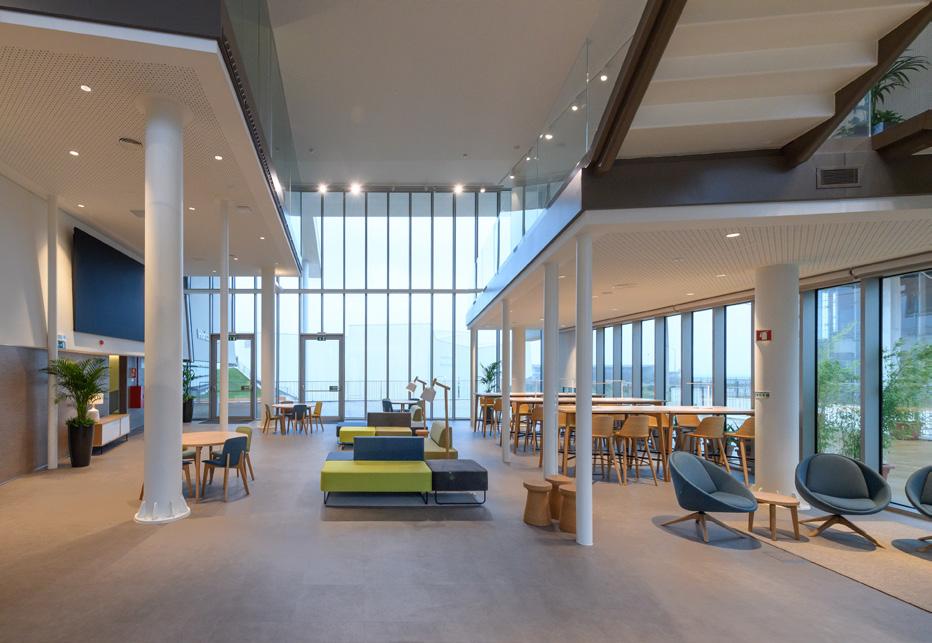
skills improvement. It is a flexible quality space inspired by the hotel’s lobby concept and meant for student use, ideal for sharing knowledge and co-creating experiences. The Westmont Hospitality Hall boasts a 200-square-meter lounge with two mezzanines for small study groups, coworking, casual meetings, and events. It is equipped with a sophisticated audio and visual support system. There is also a pantry to support coffee breaks, breakfast, cocktails, and three meeting rooms with an incredible sea view. The Westmont Hospitality Hall is also available for independent corporate events.
The institute extends to its students through the Master’s in Management Area of expertise in Hospitality & Service Management , Executive Education programs on Leading Tourism &
Hospitality, Knowledge Hub for Tourism in Africa, and Tourism & Hospitality Innovation and Entrepreneurship programs.
The institute believes that a strong focus on innovation as a critical element is essential in preparing students for the future that is to come. Within the institute’s area of expertise in Hospitality & Customer Experience under the Master’s in Management program, students can develop and manage customer-focused organizations, leading the development of new customer experience solutions and innovative
The Nova SBE campus is a place where students can find the perfect balance between academic goals, business aspirations and the Lisbon lifestyle.

new businesses based on the principles of hospitality.


Hospitality & Customer Experience students will have the opportunity to participate in classes, talks and seminars taught and presented by professors and international consultants in Hospitality & Customer Experience, by national and international leaders of the tourism and hospitality industry, as well as by executives with knowledge and practice in customer experience in organizations hailing from sectors such as banking, healthcare, entertainment, technology, sports, and retail. “This integrated and innovative approach, combining academic knowledge with a strong connection to the industry and practical experience, gives students a set of skills and necessary tools to pursue a career linked to innovation and the customer experience in different sectors,” elucidates Sérgio.
The program includes specific courses in Digital Transformation in Hospitality, Hospitality & CX Innovation, Service Excellence, Revenue Management, and Hospitality Expansion & Internationalization. The area of expertise also includes a complementary innovation program that will guide students on an entrepreneurial journey where they can develop creativity and entrepreneurial skills, develop their own projects and even potentially start their own businesses.
In conjunction with this, the Master’s program is integrated into Nova SBE’s Master’s in Management which is positioned at the 15th best Master’s in Management 8in the world according to the Financial
Times Rankings and combines courses in the management area with dedicated components in the hospitality & customer experience domain.
In executive education, programs include Nova SBE faculty with a large experience in management and national and international tourism and hotel management experts, and close partnerships with global consulting firms such as Boston Consulting Group, PwC, IDC, and leading companies such as Pestana Hotel Group.
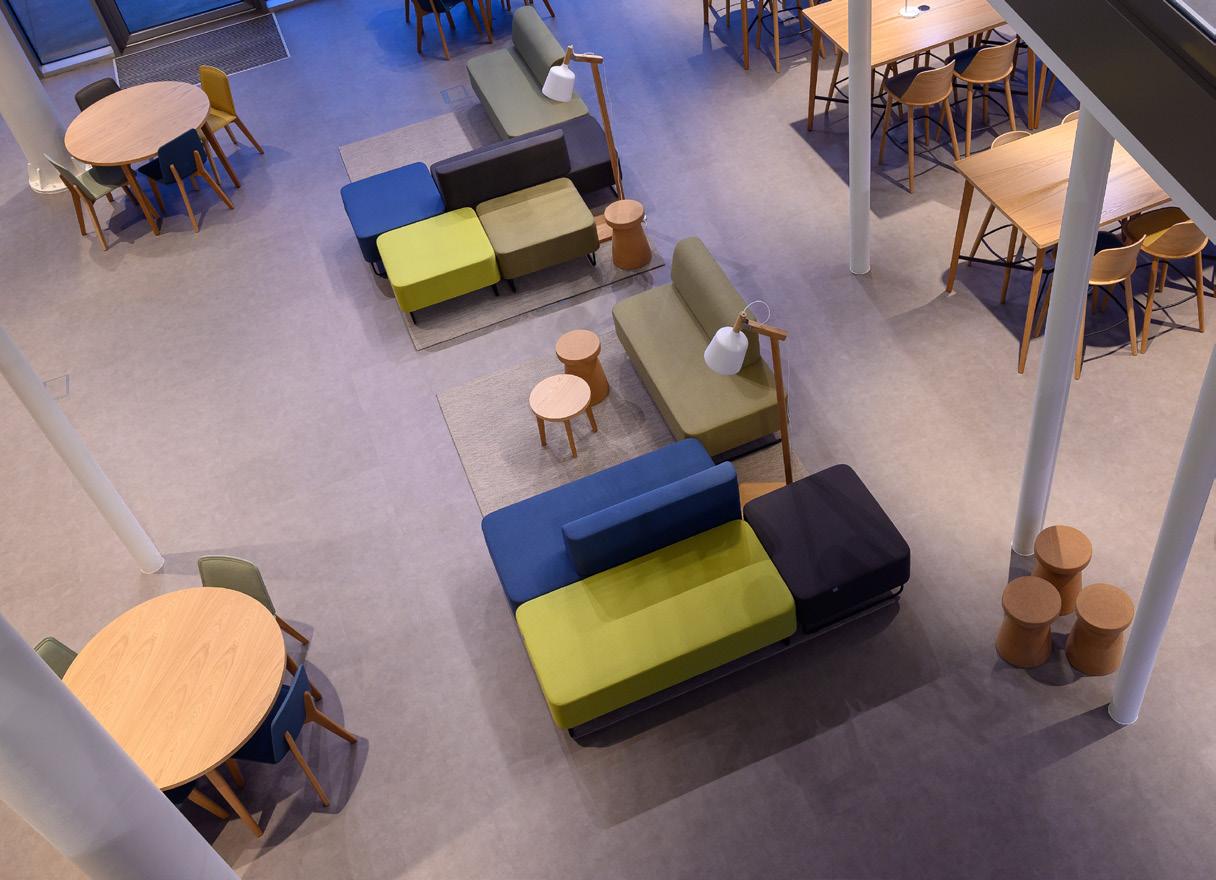
The program has a very diverse faculty, including national and international professors, with solid academic backgrounds but also
strong professional experience in the important areas of the program (management, tourism & hospitality, digital, innovation, service management, operations management, and so on). “The international reputation of Nova SBE, with 40 years of consistent growth, places it today among the Top 15 of the elite Business Schools in the world with its Master’s in Management and Master’s in Finance, and a leader in Portugal, which is enhanced by a set of partnerships with 116 international schools from a total of 38 countries in different areas of expertise linked to management,” reveals Sérgio. More than 50% of Nova SBE Master’s students are international, and 34% are also international
The Nova SBE is a learning hub for students interested in exploring customer excellence experiences, business opportunities, or careers.
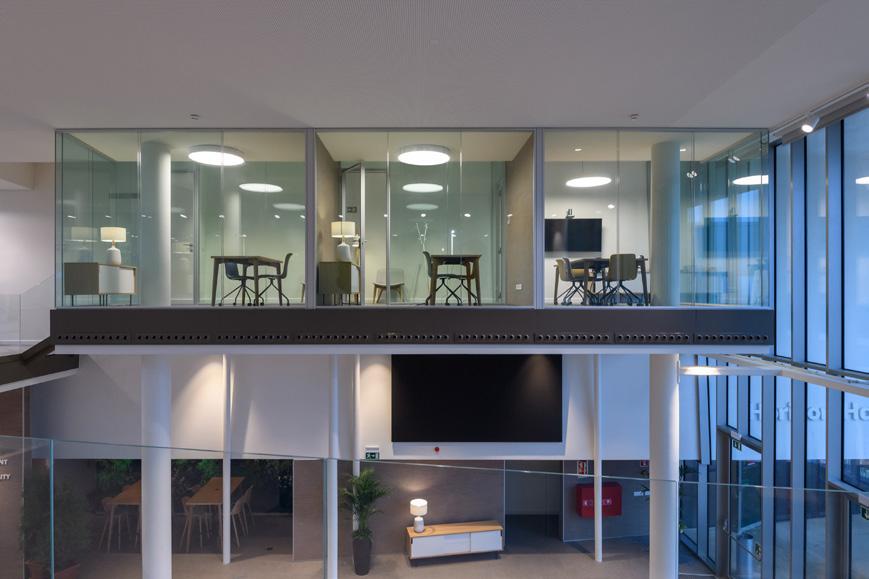
in the program, including students from Germany, Austria, Belgium, China, France, Italy, The Netherlands, Turkey, and Tunisia.
Sérgio adds, “This multicultural environment gives our students the possibility of contact with other cultures, working methods, and different perspectives on topics relevant to the future.”

and Academic Collaborations help form the Strong Foundation for Quality Education Forming industry and academic collaborations is critical as it helps identify the challenges encountered by institutes in tourism and hospitality education and provides insight into how these challenges could be effectively managed in the future.
The Nova SBE Westmont Institute of
Tourism & Hospitality is itself an example of this virtuous partnership between academia and the private sector, supported by an advisory board that includes representatives from global companies such as Booking.com, The Standard, the President from the National Tourism Board of Portugal and the European Travel Commission, successful entrepreneurs and academics with proven experience.
On the other hand, the principles of development of the institute’s programs, whether masters or executive education, are based on a close connection to the business world. “For example, our Master’s students develop their work projects in a Project Based Learning model
More than 50% of Nova SBE Masters students are international, including students from Germany, Austria, Belgium, China, France, Italy, The Netherlands, Turkey or Tunisia.

established on management challenges launched by international companies such as the Westmont Hospitality Group, Hilton International and Intercontinental Hotel Group, and the main national hotel chains,” explains Sérgio.
Ahead of the Curve
Nova SBE continually strives to stay abreast of market trends, technological innovations, crises, and knowledge management skills. So, when Covid-19 brought about significant disruption to the educational sector, the institute accelerated the changes already on the horizon. “The Covid-19 pandemic accelerated a set of trends we had already studied when we designed our program. First, the acceleration of digital and the use of technology as critical conditions for the competitiveness of destinations and companies and as a way to improve the customer experience in all businesses,” says Sérgio.
Simultaneously, the school works as a perfect lab to understand changes in consumption preferences and relations with the labor market brought on by demographic changes and improvements made even in life goals. Observations by the institute predict that
this sector will need new leaders capable of maximizing the use of digital and innovation in companies and creating new ways of providing consumer experiences. Keeping this in mind, the institute’s program is entirely focused on these dimensions, incorporating, for example, a complementary innovation program that all students have access to.

After the pandemic and with the recovery of tourism areas, the objective of Nova SBE is to continue to grow in terms of the number of students in the courses, expand its Executive Education offer, and develop dedicated courses for the community in Africa. In addition, the institute envisions organizing international conferences in tourism and hospitality management and innovation as an important international player. Sérgio signs off with another aspect of the institute’s future roadmap, “We are currently finalizing the scholarship model for our Master’s program, which will have the participation of several international companies with a particular focus on students from Africa. The program should be available in early 2023.”
Prateek Gujral, Principal Advisor (South Asia), Augustana University, South Dakota, US
Currently engaged as Principal Advisor to various International Universities, Prateek Gujral travels widely for recruitment and market development. Prateek is an authoritative and a resourceful voice in the International Education industry in South Asia. Prateek has a sharp flare for mobile technology and serves as Liaison Admin on XDA Developers (a mobile software development site) and a Senior Administrator on Swappa (a mobile trading site). A keen traveller, Prateek enjoys watching movies in his spare time.

Mental health is an essential component of a student’s educational experience, whether they are on campus or at an online university
Among college students, anxiety disorders, depression, and eating disorders including bulimia and anorexia are the most common mental health issues.
This calls for paying great attention to pupils’ emotional states and identifying outlets and coping mechanisms for unwanted or overpowering feelings.
Mental health is an essential component of a student’s educational experience, whether they are on campus or at an online university.
Let’s discuss the significance of mental health and how students can look after it.
Mental health is the state of your emotions and how you deal with challenges in your
life. If you have good mental health, you can address problems, manage stress, and overcome obstacles.
An individual’s mental health is influenced by their genetics, family history, experiences, environment, and other variables. No matter where we are on the spectrum of mental health, there are a number of things we can do to improve it.
According to the National Alliance on Mental Illness, more than 75% of mental health illnesses start before the age of 24. Knowing what to look for is vital, as this is likely to be experienced during academic years. Here are a few instances of typical mental health conditions:
The experiences a student will have in college are once-in-a-lifetime opportunities, and they but prepare him/her for lifetime
Depressing thoughts: Common symptoms of depression include irrational feelings, tiredness, thoughts of suicide or death, as well as an underlying sense of helplessness or melancholy.
Suicidal thoughts: Suicidal thoughts do not have symptoms. It is advisable to seek help if you get into a trouble or are unable to move forward.
Anxiety: Although anxiety is a typical emotion, when pressure and stress increase, it may become unmanageable. Some signs of anxiety include sweating, an irregular heartbeat, headaches, trouble concentrating, feelings of tension, an upset stomach, shortness of breath, or impatience.
It’s a great notion to put one’s own mental health first over anything else. The experiences a student will have in college are once-in-alifetime opportunities, and they but prepare him/her for lifetime. Therefore, make the most of it while being ready to handle anything life brings one’s way, instead of succumbing to the situations and self-invited pressures.
Additionally, every student should inquire about the availability of a college’s mental health support network. Whether it’s through student services, mental health counselling, or a network of mentors, parents, classmates, or professors, there are support
mechanisms around, in the form of volunteers and counsellors.
Notably, your mental well-being in college will affect: How you’re feeling overall; Your experiences in college; and your scholastic accomplishments. So better take charge of it!
Along with utilising support systems, students should seek to improve their personal health while in college (or at any other point in life). Here are a few ideas:
Enhancing time management abilities can aid in lowering stress, which can cause anxiety. It takes discipline and practice to manage time well. There are various ways to manage time better. A few examples include- prioritising one’s to-do list, being organised, scheduling one’s day in time blocks, setting realistic goals and defining time limits for certain chores
At the end of each day, one must evaluate successes and create a plan for the following day’s activities.
Creating a support system can be transformative when it comes to mental health. If one is feeling lonely, one can reach out to classmates, coworkers, friends, neighbours, or even professors. This way, there is always someone to turn to- for guidance, especially at critical times.
Endorphin levels may be increased by helping others and volunteering, resulting in increased
happiness and decreased stress. Even if one has a full schedule, making time for volunteering may be useful. There are also ways to volunteer without investing a lot of time in the endeavour. For instance, one could donate to a food drive or organise a fundraiser for a good cause.
Please be aware that inadequate sleep can cause the associated hormones to go out of whack. Neurotransmitters like serotonin and dopamine, which are crucial for preventing depression and anxiety, are regulated by sleep cycles. If you have difficulties falling asleep or staying asleep, try adopting natural sleep aids like creating a nighttime routine, switching off electronics, lowering the lights, taking a bath, or practising meditation.
Exercise of any kind is better than none! Take up any sport you find enjoyable, such a pilates, running, cycling, swimming, or walking. Working out improves blood circulation, which has the inherent ability to elevate mood.
Take
No matter how productive you are or how well you manage your time, take time to recharge. After doing some of the items on your to-do list, decide to take a break while studying.
A strategy for lowering the amount of thoughts in the head and for quieting the mind is meditation. Start out by meditating for one to five minutes each day, then gradually extend the time. We can feel better emotionally and physically by meditating.

Sender Dovchin, Principal Research Fellow and Associate Professor, Curtin University, Australia
Associate Professor Sender Dovchin is a Principal Research Fellow and Director of Research at the School of Education, Curtin University, Australia. She is also a Discovery Early Career Research Fellow of the Australian Research Council. Previously, she was an Associate Professor at the University of Aizu, Japan. She has also been awarded Young Scientist (Kakenhi) by the Japan Society for the Promotion of Science. A/Prof Dovchin is an Editor-inChief of the Australian Review of Applied Linguistics. She was identified as “Top Researcher in the field of Language & Linguistics” under The Humanities, Arts & Literature of The Australian’s 2021 Research Magazine and Top 250 Researchers in Australia in 2021. She has authored numerous articles in international peer-reviewed journals and authored six books with international publishers such as Cambridge University Press, Routledge, Springer, Palgrave Macmillan and Multilingual Matters. In a conversation with Higher Education Digest, Sender Dovchin talks about linguistic racism, its impact on our community and many more.
Lingusitic racism needs global attention as it rises in parallel with other more established – isms, such as sexism, classism, ethnicism, and ageism, highlighting the need to equally address the clear discrimination occurring on the basis of which language/s people spoke or signed and how they spoke it, as in discrimination involving the social constructs of race, gender, and class
What exactly is linguistic racism? Why does it need global attention?
Linguistic racism refers to the ideologies, structures, and practices that are used to legitimate, effectuate, and reproduce an unequal division of power and resources between groups defined on the basis of language. Lingusitic racism needs global attention as it rises in parallel with other more established – isms, such as sexism, classism, ethnicism, and ageism, highlighting the need to equally address the clear discrimination occurring on the basis of which language/s people spoke or signed and how they spoke it, as in discrimination involving the social constructs of race, gender, and class. Linguistic racism applies to (a) which language(s) one uses; (b) how one uses them; and (c) which
language(s) one does NOT use/know or one is not competent in, all according to the norms of those who (arrogate to themselves the power to) judge others by their languages.
Can you share some day-to-day examples of linguistic racism we have neglected so far?
Some female students from eastern Europe in Australia have reported that their accents are constantly pathologised through sexist rhetoric such as being described as “sexy” or having a “hot accent” but also xenophobic rhetoric such as “Russian bride”. To avoid foreign-name microaggressions, many international students have reported that they adopt renaming practices to suit English speakers’ mouths in terms of pronunciation and their ears in
terms of hearing. Many Chinese students in Australia offer alternative, Anglo-sounding names to their lecturers and peers – “just call me John” or “you can call me Sarah” –because many people cannot pronounce their names correctly. It is embarrassing to hear their names mispronounced, and they seek to avoid correcting their teachers or peers and appearing rude when it happens.
Compared to other forms of racism, what impact does linguistic racism have on people who is most vulnerable?
Linguistic racism often results in a “linguistic inferiority complex”, with negative mental health stressors resulting from the language based discrimination. Linguistic inferiority complex is an exaggeration of normal feelings of inferiority, which may further instil selfmarginalisation, self-vindication, loss of belonging and self-shaming. For many nonEnglish speaking background migrants, Aboriginal Australians and international students in Australia, learning, using and speaking English means becoming the
victim of the imagined ideal of “perfect” homogeneous English, which lead them to live a life that parallels other adolescents who are at risk of severe depressive symptoms and mental health issues such as contemplating suicide or engaging in risky behaviours such as eating disorders and substance abuse.
The first step in identifying linguistic racism is recognising what the different types of linguistic racism look like, and identifying appropriate ways to handle them. Linguistic racism can be both overt and covert. Overt linguistic racism refers to direct or explicit verbal and non-verbal acts and offences such as derogatory language, hate speech, verbal or physical abuse and name-calling. Covert linguistic racism is an indirect and subtle subordination of language users based on their usage of certain languages, often in the form of social exclusion, interpersonal and institutional rejections and other microaggressions.
To avoid foreign-name microaggressions, many international students have reported that they adopt renaming practices to suit English speakers’ mouths in terms of pronunciation and their ears in terms of hearing
Have you personally experienced linguistic racism in your career? How did you react to it?
Linguistic racism often marginalizes the knowledge produced by scholars in the Global South, women scholars of color, and other minoritized groups. Women scholars of color are compelled to become complicit with Eurocentric hegemonic knowledge and Standard English language, further perpetuating the hegemony of Western knowledge, which further risks essentialism and male hegemony. This is why, my research seeks to respond to and combat linguistic racism.

What is the impact of linguistic racism on international students? Can you explain the terms ‘ethnic accent bullying’ and ‘linguistic stereotyping’ that you have studied in detail?
Ethnic accent bullying’ refers to bullying towards English as second/foreign language speakers based on their biographical English accent – the accent connected with one’s sociolinguistic histories and biographies. It is a form of ethnic – direct and indirect forms of bullying such as racial taunts and slurs, derogatory references to culturally – specific customs, foods, and costumes, mockery or making of fun of one’s heritage languages
or accents as well as indirect or passive forms of aggression, such as exclusion from a mainstream group of peers. The linguistic stereotyping refers to language users who are not expected to speak a particular language (well) may be heard not to speak that language (well) irrespective of their actual proficiency. Language is never judged in separation from the speakers, as they face pre-fixed assumptions about his/her linguistic fluency because of how they racially and ethnically look.
How can teachers at international universities like Curtin University work toward overcoming the aftereffects of linguistic racism? Is there a ‘Curtinway’ that other universities around the world can follow?
To ensure that we, as educators and teachers, to overcome linguistic racism, we must acknowledge the linguistic diversity in the classroom. That is, accept that our students are all linguistically different, with diverse sociolinguistic backgrounds and histories. Each person’s linguistic difference is unique and one way should not be used against another. A good starting point, for example, is to call our students by their birth names when we find international students who offer us alternative English names. Explain to students that we hope to learn to pronounce their names correctly and get to know them as we work together. Apologise in advance if you are unsure how to pronounce names and make a real effort to learn birth names. Creating an inclusive classroom is also vital. We need to provide students with opportunities to express themselves in their heritage languages, dialects and varieties in
the classroom. Starting a dialogue about our students’ home languages and expressing a desire to learn about their modes of expression creates a safe environment that could help prevent linguistic racism.
The first step in identifying linguistic racism is recognising what the different types of linguistic racism look like, and identifying appropriate ways to handle them
What is your advice to the student community on linguistic racism? Our students should be encouraged to educate themselves about linguistic racism and its adverse effects in the classroom. All students, including international students with nonEnglish-speaking backgrounds, should challenge and engage with local or English as first language students. Local students should accept that international students are all linguistically different, with diverse socio-linguistic backgrounds and histories.

